 12/11/2011 12:56 12/11/2011 12:56 |
|
| | | OFFLINE | | Post: 23.757
Post: 6.333 | Registrato il: 28/08/2005
Registrato il: 20/01/2009 | Administratore | Utente Master | |
|
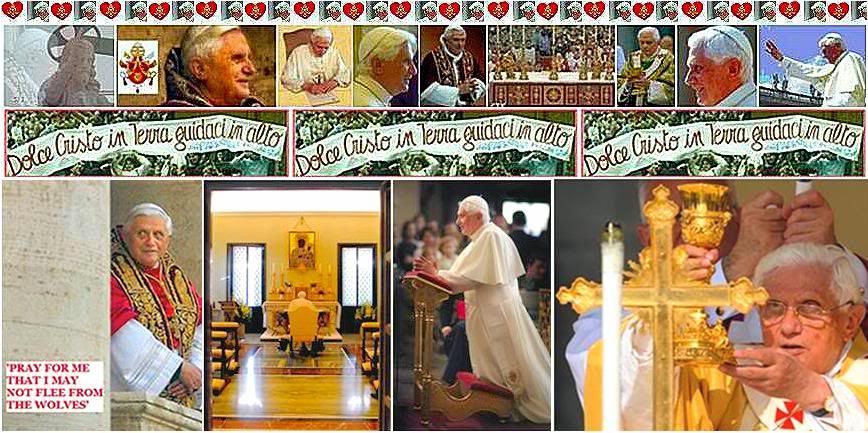

 Great excitement in Mexico and Cuba
Great excitement in Mexico and Cuba
for possible papal visit next spring

MEXICO CITY, NOV. 11, 2011 (Zenit.org).- The Churches in Cuba and in Mexico are excitedly considering the news that Benedict XVI might be visiting them this spring.
Jesuit Father Federico Lombardi, the director of the Vatican press office, announced Thursday that the Pope is considering a trip to Mexico and Cuba in early 2012.
The secretary-general of the Mexican bishops' conference. Auxiliary Bishop Victor Rodriguez Gomez of Texcoco said: "We have not received an official confirmation, of coourse, but the voices and hearts of all Mexicans are united in asking God that this great desire by both the Church in Mexico and the Holy Father be fulfilled."
He told Millennium Television that at the end of the month, the commission that prepares Benedict XVI's international trips will visit to confirm if the "conditions exist for the Holy Father to be able to be with us."
"The possibilities are very good," he said. But he pointed out that important considerations would be which cities he will visit and how suitable they would be for his health.
Mexico City is out as a possible venue because of its altitude. Similarly, the sites John Paul II visited are not in high consideration.
Mons. Rodríguez Gómez mentioned Monterrey, Veracruz, the Yucatan Peninsula, or the region of El Bajio, in the center of the country, but he said that it is very probable the visit will be confined only to one city.
Last month, the leaders of the Latin American Episcopal Council (CELAM), met with the Pope in Rome to present their pastoral plan for the next four years.
Archbishop Carlos Aguiar Retes of Tlalnepantla, Mexico, CELAM president, said the group asked the Pope to visit a Spanish-speaking territory, in addition to Brazil. (The Holy Father already went to Brazil in 2007, and Rio de Janeiro will host the next World Youth Day.)
"The Holy Father obviously cannot give an answer during these occasions because a papal trip has to be studied well, but he smiled favorably, that I can say," Archbishop Aguiar Retes reported. "He was not surprised by our request and our reasoning: It is important that he visit a Spanish-speaking country, either on the trip to Rio in 2013, or earlier."
In Cuba, the archbishop of Havana, Cardinal Jaime Ortega, said the Pope is giving priority to Cuba, and he said a papal visit would be a "great good" and "very special" for the island.
"It is excellent news and a great privilege to be able to count on the presence of His Holiness in the Jubilee Year of the 400th anniversary of the discovery of the Virgin of Charity of Cobre, patroness of Cuba," the cardinal's spokesman told the Efe agency.
Cardinal Ortega has also spoken lately of a "new relationship" between the Church and the Cuban government. The Church has been playing a key role in mediating the release of political prisoners, with more than 100 already being released.
And the cardinal said this better Church-state relationship is reflected in the pilgrimage of the image of the Virgin of Charity of Cobre, which is visiting some 300 sites on the island -- something that had not been possible since the 1959 revolution.
[Modificato da TERESA BENEDETTA 12/11/2011 13:08] |
| |
|
| |
 12/11/2011 13:27 12/11/2011 13:27 |
|
| | | OFFLINE | | Post: 23.758
Post: 6.334 | Registrato il: 28/08/2005
Registrato il: 20/01/2009 | Administratore | Utente Master | |
|
 Saturday, Nov. 12, 32nd Week in Ordinary Time
Saturday, Nov. 12, 32nd Week in Ordinary Time
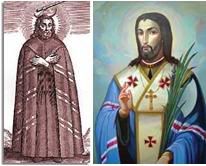 St. Josaphat (b Lithuania 1584, d Russia, 1623
St. Josaphat (b Lithuania 1584, d Russia, 1623
Bishop and Martyr, Patron Saint of the Ukraine
Born around the time that the Church of Ruthenia split, with some
Orthodox returning to communion with Rome (Uniates), he grew up
a Uniate, with a reputation for holiness even as a boy. He became
a Basilian priest, well-schooled and ardent in preaching the Catholic
faith. After heading many monasteries, he became Bishop of Vitebsk
at age 38. His preaching converted many orthodox to Catholicism,
including Ignatius, Patriarch of Moscow, and a descendant of the
Paleologue emperors. He was murdered by a mob in Vitebsk who
supported a dissident hierarchy that had developed against him.
Lying in state, his body had the odor of sanctity and was incorrupt
when it was exhumed five years later. His remains were later taken
to Rome where he is buried in St. Peter's Basilica. Hos body was
exposed intact in 1797. In 1867, he became the first Eastern saint
to be canonized in the Latin rite.
Readings for today's Mass:
www.usccb.org/bible/readings/111211.cfm
AT THE VATICAN TODAY
The Holy Father met with
- Cardinal Marc Ouellet, Prefect of the Cognregation for Bishops (weekly meeting)
- Participants in the International Conference on Adult Stem Cells under the auspices of the Pontifical
Council for Culture. Address in English.
- H.E. Herman Van Rompuy, President of the Council of the European Union, with his wife and delegation.
OR today.
 Illustration: St. Paul preaching, Joseph-Benoit Suvee, 1779
Illustration: St. Paul preaching, Joseph-Benoit Suvee, 1779
The Pope to European Catholic volunteer workers:
'Be instruments of God's love for a more humane society'
Other Page 1 news: Khartoum air force launches second air attack this week against refugee camps in nely independent South Sudan, killing at least 20 civilians and wounding docens of others; worlwide stock markets ceoup recent loses as they recound with news of Italy's austerity measures; UNICEF says current flooding in Thailand due to monsoon rains has caued almost 600 deaths by drowning, including 77 children; and a teaser for the report on the OR-sponsored colloquium on minsubderstandings between the media and the Church. (The painting of Paul preaching alludes to conference chair Cardinal Ravasi's statement that such misunderstandigns about the Church date back to the arliest days of Christianity, as Paul describes in his letters.)
[Modificato da TERESA BENEDETTA 12/11/2011 20:37] |
| |
 12/11/2011 14:55 12/11/2011 14:55 |
|
| | | OFFLINE | | Post: 23.759
Post: 6.335 | Registrato il: 28/08/2005
Registrato il: 20/01/2009 | Administratore | Utente Master | |
|
 Is the papal delegate in charge of administering the Legionaries of Christ up to the job? One year since Cardinal Velasio de Paolis took over the reins until the LC can re-organize and re-orient itself from the personality cult it had become for their late founder Marcial Maciel, the AP's Nicole Winfield interviews him and offers this analysis. The lack of any real change at LC is outrageous, and I hope someone calls Benedict XVI's attention to articles like this one from AP. I have been wondering, in fact, why Sandro Magister, who has been such an advocate of replacing the LC leaders most associated with Maciel, has not written about tHE LC in quite a while. Perhaps the Pope needs someone in the Curia who has the zeal, orthodox purity, intelligence and competence of Archbishop Charles Chaput to tackle tasks like this....I am far more outraged at this than Cardinals Bertone and Ravasi missing in action when someone at the Vatican needs to speak up for the Pope and tout de suite! But the three cardinals all have one thing in common - they do not seem to realize the flagrant disservice they are doing to the Pope.
Reform lags in Maciel's Legion -
Is the papal delegate in charge of administering the Legionaries of Christ up to the job? One year since Cardinal Velasio de Paolis took over the reins until the LC can re-organize and re-orient itself from the personality cult it had become for their late founder Marcial Maciel, the AP's Nicole Winfield interviews him and offers this analysis. The lack of any real change at LC is outrageous, and I hope someone calls Benedict XVI's attention to articles like this one from AP. I have been wondering, in fact, why Sandro Magister, who has been such an advocate of replacing the LC leaders most associated with Maciel, has not written about tHE LC in quite a while. Perhaps the Pope needs someone in the Curia who has the zeal, orthodox purity, intelligence and competence of Archbishop Charles Chaput to tackle tasks like this....I am far more outraged at this than Cardinals Bertone and Ravasi missing in action when someone at the Vatican needs to speak up for the Pope and tout de suite! But the three cardinals all have one thing in common - they do not seem to realize the flagrant disservice they are doing to the Pope.
Reform lags in Maciel's Legion -
but the papal legate justifies his 'strategy'
By NICOLE WINFIELD

VATICAN CITY, Nov. 12 (AP) — When Pope Benedict XVI took over the disgraced Legion of Christ religious order last year, expectations were high that heads would roll after one of the greatest scandals of the 20th century Roman Catholic Church.
One year later, none of the Legion's superiors has been held to account for facilitating the crimes of late founder Rev. Marciel Maciel, a drug addict who sexually abused his seminarians, fathered three children and created a cult-like movement within the church that damaged some of its members spiritually and emotionally.
An Associated Press tally shows that disillusioned members are leaving the movement in droves as they lose faith that the Vatican will push through the changes needed.
The collapse of the order, once one of the most influential in the church, has broader implications for Catholicism, which is shedding members in some places because the hierarchy covered up widespread sexual abuse by priests.
In an exclusive interview, the man tapped by Benedict to turn the Legion around insisted that the Pope tasked him only with guiding the Legion and helping rewrite its norms— not "decapitating" its leadership or avenging wrongdoing. [That may be the way he interprets his mandate to administer the LC in the name of the Pope, but how, to use a cliche, did he expect to make an omelet without breaking eggs? The Pope expects him to carry out his mandate as he sees fit, but if one year later, things are still as they were, then he is obviously failing the Pope. How do you bring order into an organization while still retaining those who landed it in the mess it's in by their apparent complicity in their founder's immoralities? Men for whom it was more important to nurture the personality cult of Maciel - inherently wrong to begin with because the only cult a religious order should nurture is the cult of Christ - rather than confront him and challenge him when he was still alive for the good of the Legion itself? Obviously, they were too invested themselves in the power structure in which they belonged to rock the boat in any way, never mind the double life that their 'sainted' founder was leading! I do not doubt that these men who were, in effect, accomplices of Maciel because they never wavered in their promotion of his cult, have individual virtues that are commendable, but none that helped them see the light at all in dealing with Maciel.]
Cardinal Velasio De Paolis ruled out any further investigation into the crimes of Maciel, who as a favorite of Pope John Paul II had been held up as a living saint despite well-founded allegations — later proven — that he was a pedophile. [Further investigation is less important than taking out Maciel's accomplices from the leadership of the LC! Besides, how can you investigate affairs involving the very people whom you trust to keep running the LC as they did in Maciel's time?]]
"I don't see what good would be served" by further inquiry into a coverup, the Italian cardinal said. "Rather, we would run the risk of finding ourselves in an intrigue with no end. Because these are things that are too private for me to go investigating."
The Holy See knew of the pedophile accusations, yet for years ignored his victims — as well as complaints about his cult-like sect — because he attracted men and money to the priesthood. As it is, John Paul's legacy was marred by his close association with Maciel.
Benedict's legacy, already tarnished by the sex abuse scandal, may well rest in part on how he cleans up Maciel's mess. [If anything, this statement should be an electric jolt to shake De Paolis from his counter-productive passivity - instead of doing a service for the Pope, he is actually contributing ammunition to the Pope's detractors who will not hesitate to use the LC case against him!]
Critics, including some Vatican officials, contend De Paolis has an obligation to uncover the truth and take more radical action, given that the Vatican itself found Maciel created a twisted, abusive order to cater to his double life.
The Vatican also determined that for the Legion to survive it must be "purified" of the influence of Maciel, who died in 2008, since its very structure and culture had been so contaminated by his obsession with obedience and secrecy. Members were forbidden from criticizing their superiors, were isolated from their families, and told how to do everything from praying to eating an orange.
In the absence of radical change, the movement has seen a dramatic decline in membership since the scandal was revealed in 2009.
An estimated 70 of the 890 Legion priests and upward of a third of the movement's 900 consecrated women have left or are taking time away to ponder their future.
Seminarians have fled — 232 last year alone, an unusually high 16 percent dropout rate for one year. New recruits are expected to number fewer than 100 this year, half what they averaged before the scandal.
The AP compiled the figures based on interviews with more than a dozen current and former members, who outlined inconsistencies in partial statistics provided by the Legion.
In August, about 20 current and former Legion priests met secretly for a week in Cordoba, Spain, to discuss forming an association to support Legion priests who leave the order, participants told the AP. The move could well encourage more to leave.
And earlier this month, the six editors of the Legion-affiliated Catholic news agency Zenit quit en masse, following the resignation of Zenit's founder. He had cited differences in editorial vision and a loss of trust with the Legion's superiors over the way they covered up Maciel's crimes.
The Rev. Richard Gill, a prominent U.S. Legion priest until he left the congregation in 2010 after 29 years, has openly criticized De Paolis's efforts, particularly his refusal to remove compromised superiors, saying "dismissals will be needed to restore some measure of confidence in the Legion."
He called for an investigation into the origins of the scandal and noted that for most of the 70-odd priests who have left, "loss of trust in the leadership has been the primary reason."
Claudia Madero left the movement in August after living like a nun for 35 years, citing the refusal of her Mexican superiors and De Paolis to embrace change.
"It's true there have been some changes, but these are incidental, not essential," she wrote in her resignation letter.
Benedict, however, gave De Paolis an unofficial vote of confidence last month when he kept him on as his Legion envoy while letting the 76-year-old Italian retire as head of the Vatican's economics office.
Benedict's spokesman, the Rev. Federico Lombardi, declined to say if the Pope thought De Paolis's mandate should be changed given the exodus, saying the cardinal speaks for himself.
Legion spokesman the Rev. Andreas Schoeggl, meanwhile, gave De Paolis a thumbs up, saying his work had been "great," with all Legion priests helping rewrite the order's constitutions — a shift from the past when decisions were made only at the top.
Yet if the current membership trends continue, the Legion may simply wither away as fewer people join a scandal-tainted congregation that the Vatican itself said has no clearly defined "charism" — a church term for the essential spirit that inspires a religious order and makes it unique.
After all, what would happen to the Franciscans if St. Francis were discredited? The Missionaries of Charity if Mother Teresa were found to be a fraud?
De Paolis paused when asked to define the Legion's charism. "Bella domanda," he said — "good question." Noting that it was a work in progress, De Paolis cited the Legion's evangelical zeal and insisted that even without a clearly defined charism, the vast majority of Legion members are happy, doing good work and serving the church.
But three current members of the movement say the reality is more complex: Some are thinking of leaving but haven't taken the leap, some are in denial of the extent of the scandals, while others are actively working toward reform.
Members have coined the terms "awake" and "asleep" to describe where colleagues are in discovering the abuses of the Legion system, a process that is complicated by the Legion's restrictions on use of the Internet and email.
And despite some changes, abuses continue: "Dissidents" are transferred away from their communities and subject to emotional harassment to test their resolve, three current members said on condition of anonymity because of fear of punishment.
De Paolis defended his commitment and approach to the reform, saying said he had "inserted" himself into the Legion's administration, expanded the Legion's governing council and shuffled some superiors around.
[Has he not learned from the sad experience of bishops dealing with abuses committed by their priests that shuffling people around who have anything to do with wrongdoing - in this case, LC superiors who were Maciel's trusted aides for decades - is just like rearranging deck chairs on the Titanic with the iceberg in view? Worse, because the 'deck chairs' in this case are already beyond salvaging as it were.
Charity, forgiveness and giving people a second chance - these are all admirable, but what about the power of symbolism and example? Not to mention, simple justice. This week, Penn State University dumped its president and legendary football coach overnight literally after it had determined that these men knew about sordid pedophile abuses committed by one of their coaches years ago and did nothing about it.
The first act De Paolis should have done was to relegate the LC honchos who were in Maciel's poncho, so to speak, to jobs that had nothing to do with running the LC, so he could start with a clean slate. How do you rebuild a rotten organization with the same men who promoted that rot????]
He said he hasn't dismissed any superiors outright because he needs them to learn the complex details of the order's structure, culture and finances. [Well, it has been a year since then. How much longer is he going to keep them on in positions of leadership when, as the attrition this year shows, the LC rank-and-file have lost their faith and trust in the organization precisely because the same men who ran it for Maciel continue to run it, and De Paolis appears to be merely a figurehead?]
"How can I, someone who doesn't know the Legion, who knows only a bit of Spanish, enter saying I'm in charge?" he asked. "If they (the superiors) wanted to sabotage me, it would have been so easy. If I had made myself the superior, they wouldn't give me information, they would have hidden it from me." He said his priority was to persuade the Legion's leaders to sow change from within. [NO! Once, you have learned from them what you need to learn - SURELY A YEAR IS MORE THAN ENOUGH! - make them 'sow change from within' eksewhere, and starting with their own person, doing other jobs that do not have any leadership responsibility! They obviously need to work on themselves individually, which they will never do, given human nature, if they continue to think of themselves as the big wheels, or have the excuse of saying they have so much responsibility they have no time to think of their private lives (and consciences)! No priest - and no Christian, for that matter - will ever be anything less for being humbled???]
Maciel founded the Legion in Mexico in 1941 and it became one of the fastest-growing religious orders in the world, praised by Vatican officials who routinely celebrated Masses for the Legion and in Maciel's honor.
Victims began to go public in the mid-1990s with allegations that Maciel had sexually abused them as seminarians, but the Vatican shut down a church trial, only to resurrect it years later. Maciel was sentenced in 2006 to a lifetime of penance and prayer — an inglorious end for a man who had enjoyed unparalleled access to John Paul II.
In his interview with the AP, De Paolis revealed for the first time that the Legion had reached financial settlements with "four or five" people who said they were sexually abused by Maciel, paying a relatively modest $21,000 to $28,000 ((euro) 15,000-(euro) 20,000) apiece. Negotiations, however, stalled with one victim who demanded millions, he said.
No one has publicly accused top Legion superiors of sexual abuse. But few believe Maciel's closest aides were ignorant of his double life, given that he would disappear for weeks on end with thousands of dollars to visit his family and, by the end of his life, was openly living with his girlfriend.
Monsignor Rino Fisichella, who heads the Vatican's evangelization office, said last year that the Vatican would be wise to look at who covered up for Maciel inside the Legion — "those who took his appointments, those who kept his agenda, those who drove him around."
Yet some suggest De Paolis's reluctance to investigate the cover-up is based on fears the revelations could point to complicity by Vatican officials, who defended Maciel even after the sex abuse allegations were established.
"With the Legion, I believe there were some who knew, but very few," De Paolis said of Holy See officials. "The others saw that this group was blossoming, that it brought fruits, it offered a service to the church." [Is he saying that the Legion's work justified, for these 'few' he refers to at any rate, turning a blind eye to flagrant immorality? That is appalling!]
De Paolis says he wants to save the fruits, the good that remains in the Legion. {BUT YOU DO NOT DO THAT BY KEEPING THE ROTTEN APPLES AT THE TOP OF THE BASKET!] But those who have been harmed insist the Vatican must assign blame where it's due and fix the wrongs, or lose all credibility.
"We're angry at the Church for allowing this," said Peter Kingsland, a Catholic from Surrey, British Columbia, whose daughter was consecrated in 1992. "They could have claimed ignorance before, but they're no longer ignorant — and now they're a party to it."
I think we all need to pray hard for Cardinal De Paolis who seems to be undoing all of Benedict XVI's good work to clean house by this inexplicable and almost unforgivable insistence on keeping on Maciel's enablers and therefore accomplices as administrators!
[Modificato da TERESA BENEDETTA 13/11/2011 17:05] |
| |
 12/11/2011 17:45 12/11/2011 17:45 |
|
| | | OFFLINE | | Post: 23.760
Post: 6.336 | Registrato il: 28/08/2005
Registrato il: 20/01/2009 | Administratore | Utente Master | |
|
 I thought that by translating the following remarks Cardinal Ravasi made to Vatican Radio, I might be able to provide a good overview of yesterday's 'media seminar' at the Vatican. So I decided to translate it ahead of the OR story about the seminar in today's issue. Alas, it's not what I thought it would be... Anyway, here it is first:
Cardinal Ravasi on the Church and the media:
I thought that by translating the following remarks Cardinal Ravasi made to Vatican Radio, I might be able to provide a good overview of yesterday's 'media seminar' at the Vatican. So I decided to translate it ahead of the OR story about the seminar in today's issue. Alas, it's not what I thought it would be... Anyway, here it is first:
Cardinal Ravasi on the Church and the media:
'The Church must be open and sensitive in communicating
but it must guard against diluting the Christian message'

November 12, 2011
'Misunderstandings: The Catholic Church and the Media' was the topic of an all-day colloquium yesterday at the Vatican at the initiative of L'Osservatore Romano as part of its observance of the newspaper's 150th anniversary.
After an introduction by OR editor Giovanni Maria Vian, two Church historians and five non-Italian Vatican correspondents delivered prepared remarks on the major issues that have arisen in this respect during the first six years of Benedict XVI's Pontificate.
[The audience was, apparently, officials and staff of Vatican Secretariat of State which directly supervises the Vatican's various communications media and exercises general supervision of Curial activities in Rome as well as the Vatican's worldwide diplomacy.]
Cardinal Gianfranco Ravasi, president of the Pontifical Council for Culture, chaired the meeting, and gave the concluding remarks. He spoke to Vatican Radio about it:
It was my task to draw conclusions from this meeting, which was very detailed, covered a lot of ground, and was mostly entrusted to 'secular' - in quotation marks - journalists, and therefore, to persons who do not function as apologists nor act in self-defense. [Certainly, they would not be apologists for the Church - they ought to be objective reporters about the Church and the Pope - but their criticisms were necessarily directed at the communications missteps of the Vatican.]
Journalists from Le Figaro, The Guardian, Die Welt, Spanish television (Antena 3) spoke up. This was therefore a diverse and ample horizon of views, very attentive, who gave their analyses, sometimes quite severe, and with a series of criticisms that were to the point.
I wished to sum it all up in a kind of pentagram, the general rules to keep in mind about news reporting on the Church, given the great revolution in communications technology in our day, which is no longer as it was in the time of the Second Vatican Council (1962-1965)and the encyclical Humanae vitae in 1968, when the news media were dominated by the press.
[It's not that simple! The print media still 'dominate' today in the sense that the major newspapers in the West continue to 'set the agenda', as it were, for what the rest of the news media focus on! These newspapers, even if their print circulation is going down (their online presence is often massive), continue to take the lead in the shaping of public opinion, because it is possible for them to keep tightly focused on pushing their agenda, unlike the Internet where the user is at total liberty to find news and information of a great variety without a focus, unless the user happens to be researching a specific subject. Most radio and TV news outlets, even the major networks, continue to take their lead from whatever the newspapers and magazines are reporting, and so do most online news-and-opinion sites - all of whom derive their 'facts' about news events from what the press reports say (along with the attendant editorial biases of said newspapers). The non-print media are then free to further embellish and embroider the 'facts' they are given with all kinds of opinion intended to further shape public opinion.]
Today we have 'virtuality', information transmission and access accelerated to the extreme, with TV and all kinds of imagery. I gave some indications that I would summarize in two faces, two fundamental trajectories.
On the one hand, to remember always that it necessary for the Christian message to be in dialog with the world, and therefore, there will be equivocations and difficulties in understanding the language of the Church which is sometimes self-referential. But at the same time, the Church should have precise channels of communication. [The Vatican has no lack of that, but other than the Pope and his direct messages (not as filtered through the secular media), it's the messages coming from various Vatican agencies that are often confusing or misleading, and their messengers who are unable to make proper use and take advantage of that wide array of communications possibilities!]
On the other hand, one must also be aware that this dialog is not meant to dilute or weaken the Christian message which by its nature has the power to scandalize, to provoke.
It is almost like a movement on two fronts - on the one hand, with great openness, sensitivity and attentiveness; on the other, never to dilute the Christian message.
I also wanted to point out that this problem is not just our problem today. So I referred to the letters of St. Paul which can be read from a perspective that has to do with all the critical problems that Paul had to face in communicating his message.
In all the letters, there are questions that are almost analogous to our day, even if the specific topics are different, analogous to the communications difficulties that we have had to face.
Every time one tries to enter, as Paul did, into a world that is in ebullition, in a process of change - as the Greek world was in his time, as the informatics world is today - it is inexorable that there will be communications problems. They are part of itself, but they must be experienced and worked through carefully.
[The analogy to St. Paul is valid only insofar as human nature has not changed nor is it likely to, but the very concrete nature of the global village today and the era of instant communications to anyone anywhere changes the whole dynamic of mass communication.
Paul only had to address small communities at a time, and it was the internal differences within these communities that created the communications difficulties, nor were these communities in communication with each other. More importantly, the difficulties were not mediated - much less deliberately generated - by a third party which is omnipresent and near omnipotent as the media are in our day!
I was hoping for some brilliant summation from Ravasi - perhaps his prepared remarks are - but this extemporaneous 'summation' for RV falls far short. No comparison to an extemporaneous Joseph Ratzinger summation or fit-to-print verbal essay on any subject whatsoever!]
On the other hand, the account in today's issue of the OR is written by someone who is obviously a Ravasi fan to the point of making unwarranted and out-of-place opinions in the middle of her reporting....
'One must know to be both ancient and modern':
All the most relevant 'thorns' that have stuck most
in mass media reporting about Benedict XVI
by Giulia Galeotti
Translated from the 11/12/11 issue of

"The question of communications, its embarrassments and equivocations, is not just a question for today but goes back to the Pauline epistles. Referring to prejudices, incomprehensions and misunderstandings, Paul in fact used the verb 'adulterate' which attests unequivocally to the fact that the problem we faced in our topic for today, which has been treated freely at great length, was already present then".
Thus did Cardinal Gianfranco Ravasi, president of the Pontifical Council for Culture - with the intelligence, the culture, the balance and the profundity that are characteristic of him - conclude the colloquium entitled "Misunderstandings: The Catholic Church and the media" organized by our newspaper and held Thursday, Nov. 10), at the Old Synod Hall in the Apostolic Palace.
[
{Lady, this ain't no editorial! Even Vatican Radio and the news reports of the OR writers who report on the Pope do not encumber their news reports on the Pope with such editorial qualifiers! What's worse is that the quotation Galeotti chose to use is not even especially remarkable, and certainly not proof of anyone's 'intelligence, culture, balance and profundity'
The cardinal then added something precious and substantial: "But Paul did not limit himself to defending his positions. He reacted, he sought out vaccines with which to inoculate [against incomprehension, I suppose. At any rate, a rather limp metaphor].
In a few words, he caught the sense, the intentions and the legacy of a meeting which, in many ways, will surely leave its mark. [Yet another personal opinion, not fact!]
With interventions by the Vatican correspondents of some of the major newspapers in the Western world, one after the other, the most outstanding 'thorns', as defined by our editor, in the relationship between the world media and Benedict XVI were ticked off and analyzed. With an almost philological attention, refined acuteness and a complete absence of reverential fear, many if not all these problems were passed through a fine-tooth comb.
The participants analyzed the most glaring errors committed by the media in the first six years of Benedict XVI's Pontificate, errors mostly due to superficiality, sloppiness, incompetence and the obsession with finding a journalistic 'vein of gold' that could be mined profitably.
For instance, Antonio Pelayo, who is a priest and Vatican correspondent for the Spanish TV channel Antena 3, investigated what happened with the Pope's Regensburg lecture after the advance text was given out to the Vatican press corps at 6 a.m. on Sept. 12, 2006.
Some of the newsmen, he said, quickly found - out of the 3,200 words of the lecture - the Pope's citation of words by the Paleologue emperor as the golden nugget that would 'enrich' their reporting. [And ignoring everything else in the lecture, even what it was about!]
After investigating what happened next, Pelayo says he found that "it was the headlines in the Italian newspapers the next day that sounded the alarm to the Muslim countries through their embassies in Rome and their media correspondents. Neither the embassies nor the newsmen had even seen the full text of the lecture, but they lost no time after seeing the Italian newspapers on September 13, 2006, to inform their governments and public about 'the Pope's attack on Islam'."
{I want to reconcile Pelayo's findings with the timeline-reconstruction I put together on Page 130 of this thread in August last year based on the principal news reports filed at the time.]
But the same argument applies to other cases. Such as what John Allen calls 'the perfect storm' over pedophile priests in his analysis of this issue. [Allen was not able to come to Rome, but his contribution was read for him].
And it applies to the 'uproar' created by the Pope's statements on condoms and AIDS during an in-flight Q&A en route to Cameroon in March 2009. John Hooper of The Guardian said that in this case, the erroneous reporting of what the Pope said led directly to erroneous condemnations of the Pope by various politicians, government leaders in Europe and heads of international organizations. And even the British medical journal Lancet, he said, went 'too far'. [The writer fails to note that, in a shameless show of hypocrisy, the Lancet had, in fact, published months earlier an article which cited studies questioning the efficacy of condoms as a primary strategy for fighting AIDS.]
- There is also the problem of a general lack of preparation in those who cover the Vatican and more generally, in reporters who cover the religion beat.
- Then, there's the role of the news agencies in disseminating news [through their network of worldwide subscribers, any reports they file are instantly conveyed to all these outlets around the world].
-The laziness of deskmen [These are the editors who first receive the reporters' articles, stick headlines on them, and decide whether and when to post them for their subscribers. But as I have often complained, editors no longer seem to actually 'edit' the articles that are given to them - in order to tighten the language, correct grammar and style conventions, take out unwarranted editorial opinion, check questionable facts or statements, 'clean the copy', as we used to say, before publishing it or reading it on radio or TV. Most news reports seem to have been left exactly as they were submitted. Forgive me, but in the case of this very article, if I were Galeotti's editor, I would have asked her for a complete rewrite of her article - to lay out the bare facts first of what took place exactly, with a beginning, middle and end, not wander in time, and certainly not to start out with her personal impressions of the event nor to use her article as a vehicle for doing a puff-piece for Cardinal Ravasi!]
- The problem of approximation [in the sense of imprecision in stating the facts, I think]
- The tendency to minimize successes and to maximize failures and shortcomings.
John Allen also referred to 'mythification, disinformation and prejudice'. And he denounced 'the lack of context' in reports about the Church and the Pope. Media organizations, he said, "focus on their intended narrative of a certain event but miss out on the context". His example: Media coverage of the pedophile scandal when it erupted in the United States in 2002 gave the impression that the Church cared not at all for the victims of the pedophile priests. [Which, of course, goes with the aforementioned tendency to minimize what is good and maximize what is bad. In their reporting of the pedophile priests, media have not really cared about what happens to the victims - until they file and win multi-million-dollar suits against their abusers.]
[That, of course, is not the only 'lack of context' that is habitual in the media. Lack of historical context is often lacking - what happened before, recently or in the historical past, that is relevant to fully appreciating and assessing a current event. The other is the lack of perspective - geographical and numerical usually. You cannot report the misdeeds of 1,200 priests, say, in the USA, without pointing out that they committed their crimes over a period of 'x' years and that they represent only 'y' percent of the priests in the USA. I could go on and on, but I do point it out whenever this happens in a major way - most recently, in media reporting about the proportions of the Irish pedophile scandal.]
And of course, the Church herself has committed errors, and this admission was one of the most interesting aspects of the day (since only who is strong in truth can admit to error). [Why should this be surprising in any way? This was supposed to be a two-way exchange, after all. And what is there not to admit? The mistakes were obvious for all to see!]
All such errors, said OR editor Vian, such as "the media and communications disaster of the Williamson case analyzed by Paul Badde of Die Welt in a way that almost meta-historical", have been recognized by the Vatican.
It was also a unique case, Vian said, because with his letter to all the bishops of the world, Benedict XVI "personally took on the responsibility for the snafu, defended his co-workers, and put an end to all speculation". [Did he defend his co-workers???? I don't recall that, and in any case, a 'defense' was uncalled for!]
Sometimes, it was pointed out, the responses of the Church were actually counter-productive. John Allen, analyzing the US pedophile crisis was lucid in analyzing the media coverage which, although it was invaluable in constraining the Church to recognize the crisis and do something about it, was sometimes not balanced, inaccurate and destructive. However, while some in the Church were making heroic efforts to give honest and complete responses, often the reaction from others in the Church was delayed and defensive, which cemented popular prejudice against the Church instead of correcting it".
And this is why, despite the fact - paradox of paradoxes - that Benedict XVI, whom Allen calls "the great reformer in the matter of pedophile priests... who has made spiritual and structural recovery from this crisis the distinctive mark of his Pontificate", has become for misinformed public opinion "the principal symbol of the inability of the Church to deal with the sexual abuse issue, to the point that, in extreme cases, some have called on him to resign, and others have accused him before the International Criminal Court". [Does this generalization not rashly extrapolate the obvious hostility of Benedict XVI's detractors to the greater universe of the 'misinformed public', and which, if there is any basis at all, surely does not extend to the Catholics outside the Western world! In fact, while this attitude about the Pope may be true - though I cannot remember seeing actual poll figures - in Ireland, say, it is certainly not the case in the United States, for instance, much less in countries like Italy or even France, Spain and Portugal!]
The challenge, Allen says, is for both sides. "Not just the image of the Church is in play but also that of the media". [Not that the media care much about their own 'image' per se. If they have advertisers, that's all the image they need.]
In his analysis, Jean-Marie Guenois of Le Figaro, starts from the Pope's German nationality, which is not limited to its geographical connotations, but has become a point of attack that his detractors in the media have used.
Guenois noted how Joseph Ratzinger turned from 'a non-mediatic person and former Prefect of the Congregation for the Doctrine of the Faith" - in itself, he said, in 'a kind of explosive chemical reaction' - has become 'a super-mediatic Pope' [How does he define 'super-mediatic'? In the way John Paul II was? Which few journalists have yet to verbalize! I know Guenois has always been sympathetic to Benedict XVI, but other journalists still stereotype him as 'lacking charisma' despite all the millions of people he attracts when he travels abroad, and the tens of thousands of faithful who come to his General Audiences, Angelus and liturgies in St. Peter's in greater numbers than they did for his predecessor.] - "one who during the past few years has succeeded slowly to change things around, thanks to his modesty and humility, thanks to his intellectual lucidity, to his constancy of purpose, to his ability to distinguish the essential from specifics, and to efface himself in the service of the common good".
Guenois says the seemingly 'frail helmsman' of Peter's barque confronted the incubus of the sex-abuse scandals in a way that gained him respect. [Obviously, John Allen sees things differently - that the Pope's efforts have mostly fallen on deaf ears and unseeing eyes conditioned by negative media reporting!]
He has done so, says Guenois, "not through making grand statements, but with quiet, calm, slow and ultimately effective actions". From this, he believes "the German Pope has emerged even greater because it required great interior strength to weather this gigantic crisis".
But in the wake of the historical context provided in the morning session [by historians Lucetta Scaraffia and Andrea Riccardi], it was clear that the central problem continues to be the relationship between the Church and the dominant logic of the times. The divergence between the prophetic vision of the Church and the contingency-driven spirit of the times is clear and substantial.
And of course, the inadequacy of the Vatican communications media in the use of new information technology was discussed. Paul Badde quoted from Benedict XVI's March 2009 letter to the bishops of the world, in which he recounts the failure of the Vatican to learn of Bishop Williamson's negationist views by not using the Internet as the responsible officials ought to have done.
But Badde says that this resulted in the 'quantum leap' taken by the Church's bimillennial organization as it was "catapulted into the Internet age". [But the Vatican went online in 1996! It really was not the inability to fully avail of the Internet so much as the complacency of those who were directly involved in preparing the decree to lift the excommunicaitons (Ecclesia Dei and the Congregation for Bishops) in thinking that they had no need to update their dossiers on the four bishops, simply assuming they were all aboveboard. All the more shocking since Cardinal Dario Castrillon Hoyos was well-known for being a self-proclaimed computer geek! And surely, over the years, some news must have trickled into the Vatican about Williamson's declarations when he waa serving in the US-Canada district of the FSSPX!]
From all this, it was therefore possible to point out measures to overcome the mutual incomprehension between the media and the Church. If there's a lot to be done on the part of the media, the Church needs to show concrete indications of improvement in communications herself.
The new evangelization promoted by Benedict XVI could help in this respect. "If there are steps that the Church can take without betraying her identity or adopting cynical techniques of manipulation to promote better understanding," John Allen suggested, "then to carry them out would not just be a great idea but a moral imperative". {What 'techniques of manipulation' could the often media-naive types in Vatican communications come up with, wheh they have shown they can't even shoot straight with certain simple information tasks?]
Even in this, Cardinal Ravasi was lucid and invaluable. His prescription, in fact, was to seek to transform what he called the five vices of media, namely, the five errors most regularly committed as though following certain laws, to be banal, narrowly focused, provocative, superficial and prejudiced - into five virtues.
These would be: to learn what is essential; to be in the 'here and now' ('Christ's preaching was from feet on the ground'); to be incisive; to overcome self-referencing; and to avoid leaving gaps in
reporting. [Too bad there is no one-on-one correspondence between the vices mentioned, and the recommended 'virtues'. I had expected the highly-cultured Cardinal Ravasi present his 'pentagrams' elegantly, not awkwardly.]
Communications, he said, cannot merely be self-defensive 'in principle' but it must have 'a certain consistency'. By keeping her identity strong ("There can be a dialectic only if the Church preserves the 'scandal' of the Christian message", Ravasi said), the Church must nonetheless take into account that "the atmosphere, the very air in which man moves today has changed, and this has changed man himself, it has remodelled his face". [I'm sorry, but perhaps faulty paraphrasing by Ms. Galeotti is to blame for these banalities, so I will wait to see Cardinal Ravasi's full text.]
In 1950, our editor recalled in his opening remarks, Papa Montini, at his first meeting with Jean Guitton, confessed to an overriding concern: "One must learn to be both ancient and modern, and speak from tradition but in a way that conforms to present-day sensibility. What does it serve to speak the truth if the men of our time cannot understand it?"
About Benedict the communicator
Some reports and commentaries have billed the above media seminar as "Misunderstandings between the media and Benedict XVI". Even the original title was defective, to begin with. The media misunderstand the Church, but in the Church, many of those in charge of informing the public about her, do not 'misunderstand the media'; they are just too naive and unskilled, sometimes inept, in some crucial aspects of what they have to do in order to get out their message correctly and 'Oops!'-proof.
It's even more wrong to speak about misunderstandings 'between the media and Benedict XVI'. They 'misunderstand' him, often deliberately, in order to misrepresent him. He understands them all too well, and the malicious games they play, but obviously, he cannot hope to educate them singlehandedly.
He can only go on delivering his messages to the faithful and to the world the best way he can - which is excellently - making profound contact with those who are able to hear his message directly, but perhaps missing out with those who only know of him and what he says from what the media report about him, which is, of course, often highly selective in a negative way.
In fact, Benedict XVI himself should be the communications professor to the world. Nearer home, the communications people at the Vatican should learn from him. His messages are sustantial and essential, his language is simple, clear and often memorable, and if a reporter wants to know what context is, all he has to do is study the way the Pope presents the personages he discusses in his cateceheses - he places them very clearly in the context of their time and place in history, and their place in the communion of saints.
[Modificato da TERESA BENEDETTA 13/11/2011 19:34] |
| |
 12/11/2011 17:46 12/11/2011 17:46 |
|
| | | OFFLINE | | Post: 23.761
Post: 6.337 | Registrato il: 28/08/2005
Registrato il: 20/01/2009 | Administratore | Utente Master | |
|

 Benedict XVI to adult-stemcell researchers:
Benedict XVI to adult-stemcell researchers:
'Science must never compromise human dignity'

November 12, 2011
Pope Benedict XVI met today with participants of the International Conference on “Adult Stem Cells: Science and the Future of Man and Culture”, sponsored by the Pontifical Council for Culture.
In his address, the Holy Father spoke about the “truly remarkable contributions” science can make to promoting and safeguarding human dignity. At the same time, he warned that scientists must be attentive to ethical concerns in pursuing their research, so that the inviolable dignity of each human being is never compromised.
Here is the full text of the Holy Father's remarks, delivered in English:
Dear Brother Bishops,
Your Excellencies, Distinguished Guests,
Dear Friends,
I wish to thank Cardinal Gianfranco Ravasi, President of the Pontifical Council for Culture, for his kind words and for promoting this International Conference on Adult Stem Cells: Science and the Future of Man and Culture.
I would also like to thank Archbishop Zygmunt Zimowski, President of the Pontifical Council for Pastoral Care of Health Workers, and Bishop Ignacio Carrasco de Paula, President of the Pontifical Academy for Life for their contribution to this particular endeavour.
A special word of gratitude goes to the many benefactors whose support has made this event possible. In this regard, I would like to express the Holy See’s appreciation of all the work that is done, by various institutions, to promote cultural and formative initiatives aimed at supporting top-level scientific research on adult stem cells and exploring the cultural, ethical and anthropological implications of their use.
Scientific research provides a unique opportunity to explore the wonder of the universe, the complexity of nature and the distinctive beauty of life, including human life.
But since human beings are endowed with immortal souls and are created in the image and likeness of God, there are dimensions of human existence that lie beyond the limits of what the natural sciences are competent to determine.
If these limits are transgressed, there is a serious risk that the unique dignity and inviolability of human life could be subordinated to purely utilitarian considerations. But if instead these limits are duly respected, science can make a truly remarkable contribution to promoting and safeguarding the dignity of man: indeed herein lies its true utility.
Man, the agent of scientific research, will sometimes, in his biological nature, form the object of that research. Nevertheless, his transcendent dignity entitles him always to remain the ultimate beneficiary of scientific research and never to be reduced to its instrument.
In this sense, the potential benefits of adult stem cell research are very considerable, since it opens up possibilities for healing chronic degenerative illnesses by repairing damaged tissue and restoring its capacity for regeneration.
The improvement that such therapies promise would constitute a significant step forward in medical science, bringing fresh hope to sufferers and their families alike.
For this reason, the Church naturally offers her encouragement to those who are engaged in conducting and supporting research of this kind, always with the proviso that it be carried out with due regard for the integral good of the human person and the common good of society.
This proviso is most important. The pragmatic mentality that so often influences decision-making in the world today is all too ready to sanction whatever means are available in order to attain the desired end, despite ample evidence of the disastrous consequences of such thinking.
When the end in view is one so eminently desirable as the discovery of a cure for degenerative illnesses, it is tempting for scientists and policy-makers to brush aside ethical objections and to press ahead with whatever research seems to offer the prospect of a breakthrough.
Those who advocate research on embryonic stem cells in the hope of achieving such a result make the grave mistake of denying the inalienable right to life of all human beings from the moment of conception to natural death. The destruction of even one human life can never be justified in terms of the benefit that it might conceivably bring to another.
Yet, in general, no such ethical problems arise when stem cells are taken from the tissues of an adult organism, from the blood of the umbilical cord at the moment of birth, or from fetuses who have died of natural causes (cf. Congregation for the Doctrine of the Faith, Instruction Dignitas Personae, 32).
It follows that dialogue between science and ethics is of the greatest importance in order to ensure that medical advances are never made at unacceptable human cost. The Church contributes to this dialogue by helping to form consciences in accordance with right reason and in the light of revealed truth.
In so doing she seeks, not to impede scientific progress, but on the contrary to guide it in a direction that is truly fruitful and beneficial to humanity.
Indeed, it is her conviction that everything human, including scientific research, “is not only received and respected by faith, but is also purified, elevated and perfected” (ibid., 7). In this way science can be helped to serve the common good of all mankind, with a particular regard for the weakest and most vulnerable.
In drawing attention to the needs of the defenceless, the Church thinks not only of the unborn but also of those without easy access to expensive medical treatment.
Illness is no respecter of persons, and justice demands that every effort be made to place the fruits of scientific research at the disposal of all who stand to benefit from them, irrespective of their means.
In addition to purely ethical considerations, then, there are issues of a social, economic and political nature that need to be addressed in order to ensure that advances in medical science go hand in hand with just and equitable provision of health-care services.
Here the Church is able to offer concrete assistance through her extensive health-care apostolate, active in so many countries across the globe and directed with particular solicitude to the needs of the world’s poor.
Dear friends, as I conclude my remarks, I want to assure you of a special remembrance in prayer and I commend to the intercession of Mary, Salus Infirmorum, all of you who work so hard to bring healing and hope to those who suffer.
I pray that your commitment to adult stem cell research will bring great blessings for the future of man and genuine enrichment to his culture. To you, your families and your collaborators, as well as to all the patients who stand to benefit from your generous expertise and the results of your work, I gladly impart my Apostolic Blessing. Thank you very much!
Full information about the conference can be found on its website:
adultstemcellconference.org/home
[Modificato da TERESA BENEDETTA 13/11/2011 17:41] |
| |
 12/11/2011 18:02 12/11/2011 18:02 |
|
| | | OFFLINE | | Post: 23.763
Post: 6.339 | Registrato il: 28/08/2005
Registrato il: 20/01/2009 | Administratore | Utente Master | |
|
 Benedict XVI receives
Benedict XVI receives
European Council president

November 12, 2011
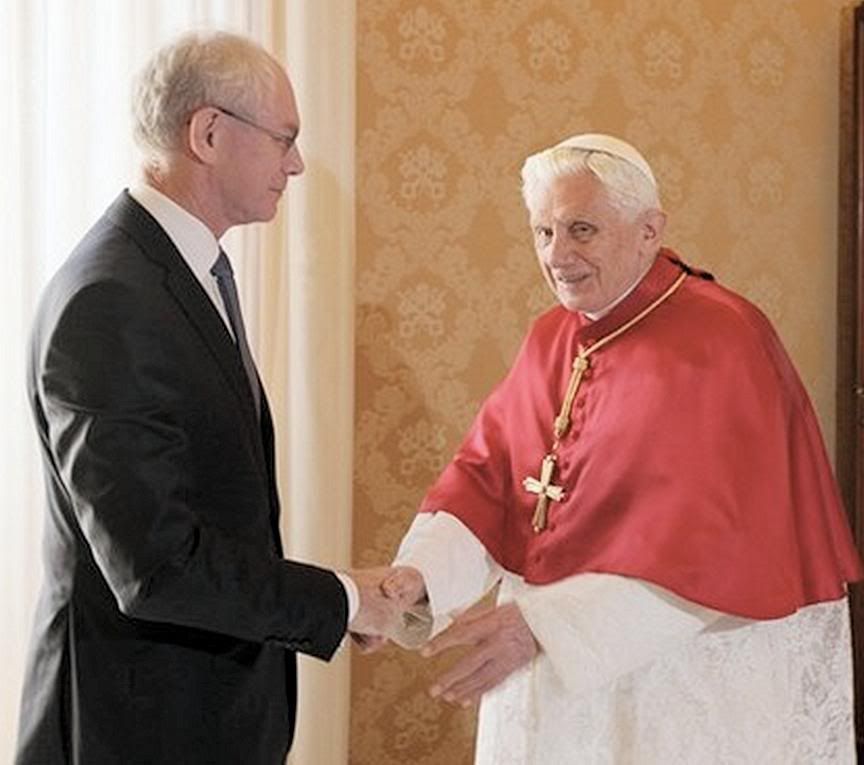
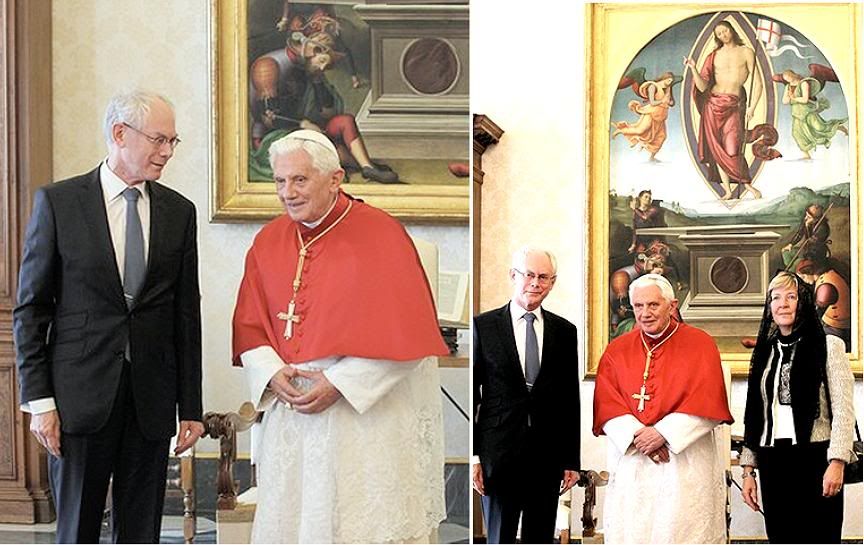
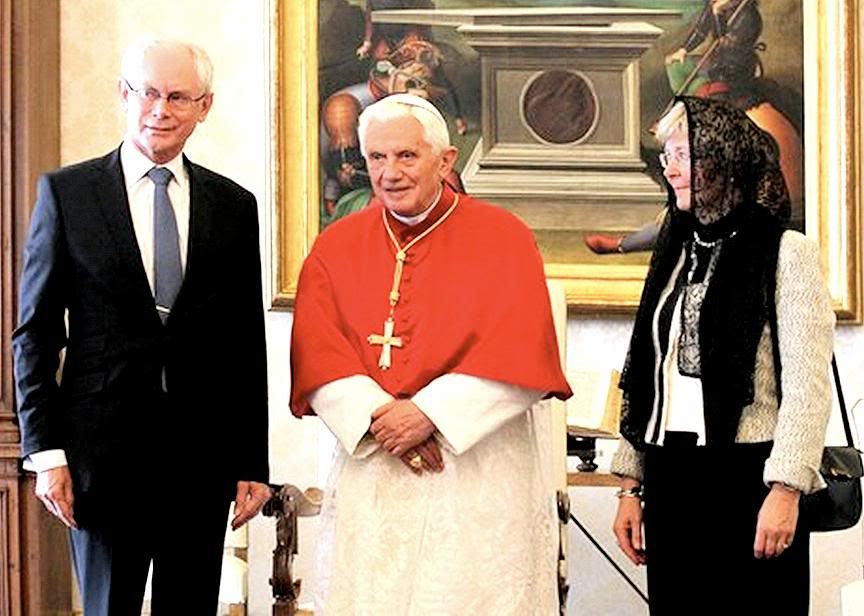
Pope Benedict XVI received the president of the European Council, Herman Van Rompuy, at the Apostolic Palace today. Below is the communiqué released by the Press Office of the Holy See following their meeting.
Today 12 November 2011, His Holiness Benedict XVI received in audience Herman Van Rompuy, president of the European Council. The president subsequently met with Cardinal Secretary of State Tarcisio Bertone S.D.B., and Archbishop Dominique Mamberti, secretary for Relations with States.
The discussions, which took place in an atmosphere of great cordiality, provided an opportunity for a fruitful exchange of opinions on the international situation, and on the contribution the Catholic Church wishes to make to the European Union.
In the course of the meeting, attention also turned to the promotion of human rights and, in particular, of religious freedom.
 adds the following adds the following:
"We live in a period of crisis; Europe has huge problems.” So said Pope Benedict XVI, speaking in French, as he showed his concern for the current economic crisis, and for the continent’s fortunes, when he received today the President of the European Council, Herman Van Rompuy. Their conversation lasted about 20 minutes.
Van Rompuy gifted the Pope with a book entitled Europa, abbozzo di un progetto [Europe: Outline of a Project]. Benedict XVI presented him with the pontifical medallion.
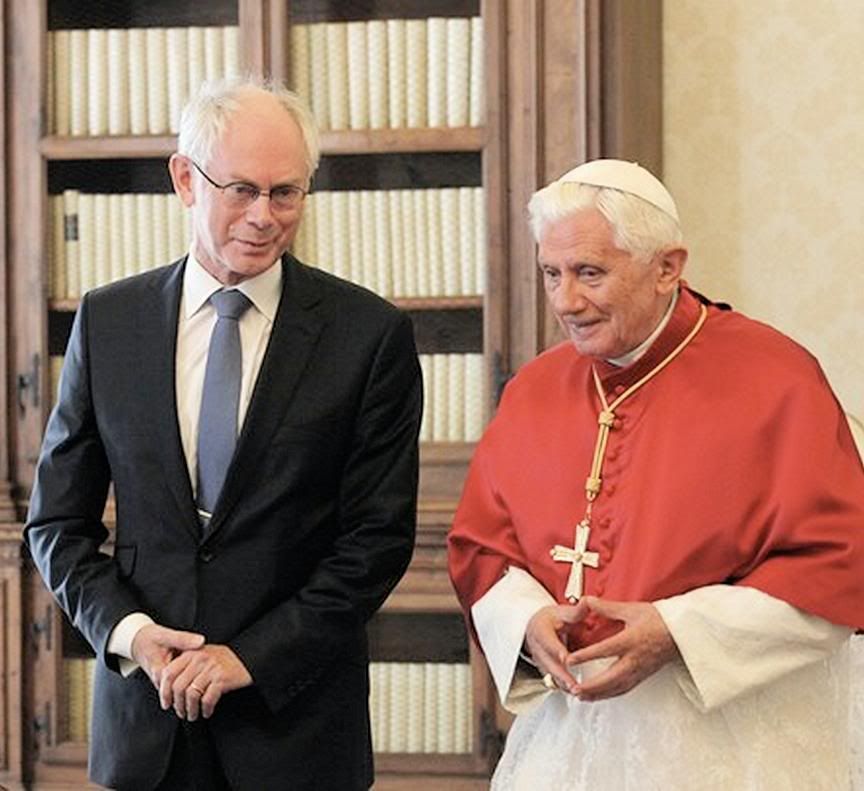
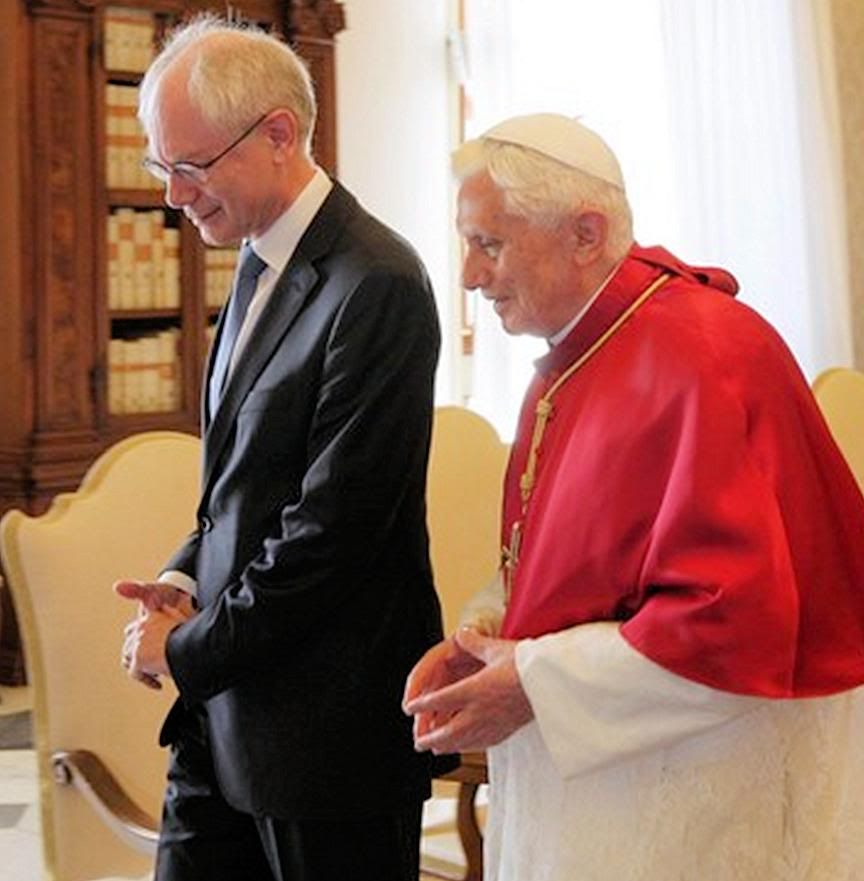
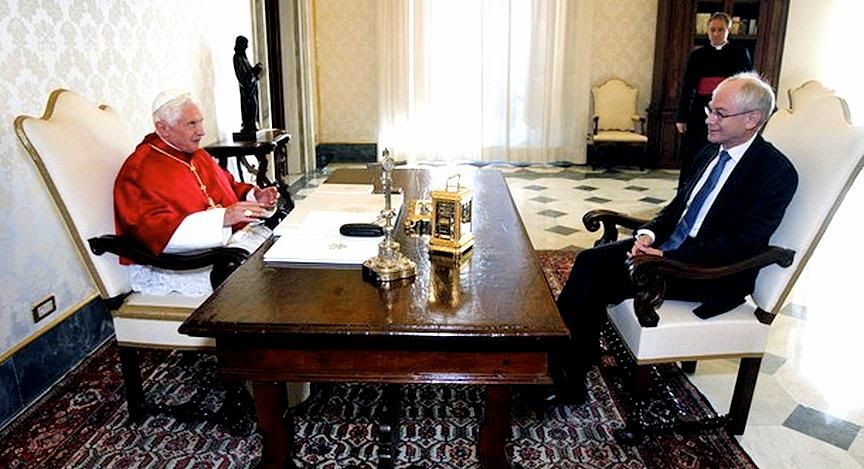
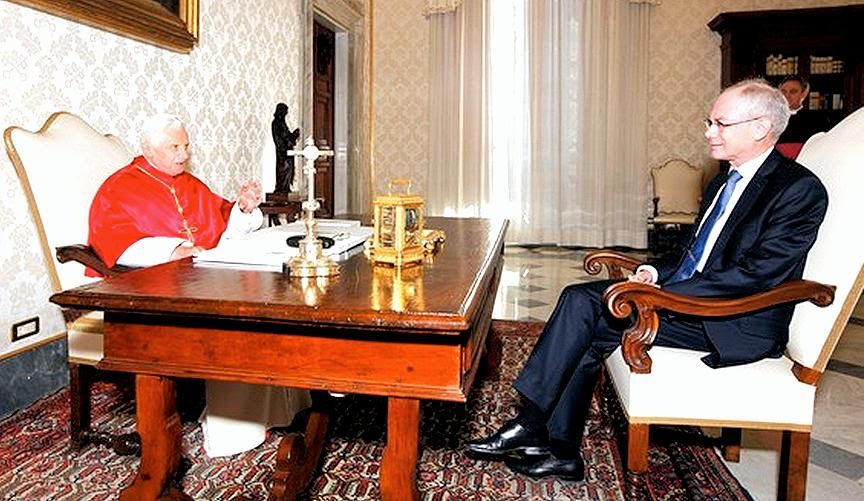
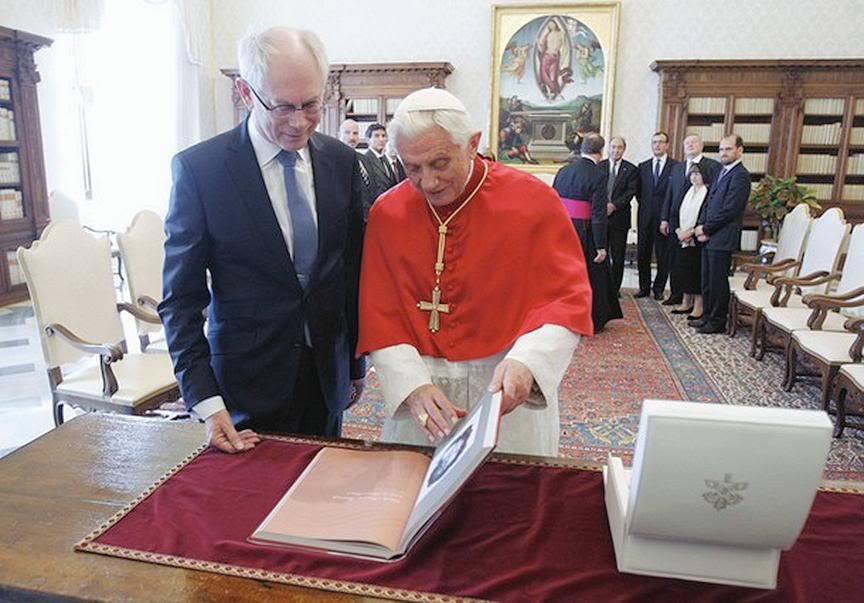
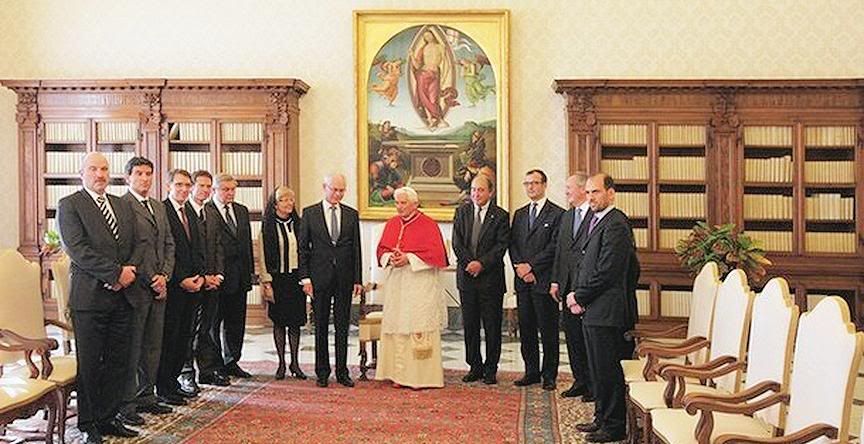
[Modificato da TERESA BENEDETTA 13/11/2011 15:15] |
| |
 13/11/2011 13:31 13/11/2011 13:31 |
|
| | | OFFLINE | | Post: 23.765
Post: 6.340 | Registrato il: 28/08/2005
Registrato il: 20/01/2009 | Administratore | Utente Master | |
|
 This post is delayed, because I preferred to translate the item from the original Italian instead of trying to work with the automatic translation provided by the INSIDER
This post is delayed, because I preferred to translate the item from the original Italian instead of trying to work with the automatic translation provided by the INSIDER.
Cardinal Turkson on the PCJP note:
'The document is not dogma, but a study
we felt it our duty to publish'
by ANTOINE-MARIE IZOARD
Translated from the Italian service of

Nov. 12, 2011
The Note published at the end of October by the Pontifical Council for Justice and Peace that proposed, among other things, the creation of a public world authority to remedy the present financial and economic crisis, may have been received tepidly in the Roman Curia, as some reports claim, but Cardinal Peter Turkson, president of the Council, says that the Council was only doing its duty.
['Duty' is a stretch. the Council is certainly free to publish any document that does not contradict the Magisterium, which the PCJP document does not. But publishing it, or even drawing up such a document, was an option, not a duty. If the document had limited itself to an analysis of the present crisis, probably no one would have minded. It's the fact that the document includes some very technical concrete recommendations that struck the wrong note.
From the start, I always looked at the document as providing some talking points about the economic crisis, because after all, the problem comes under the purview of the PCJP's interests. Everyone is free to discuss these points or even to dispute them, but no one is obliged to carry out its recommendations (nor, for that matter, even to consider them 'seriously' from the practical point of view). Catholic commentators who know economic and finance have pointed out their objections to the technical recommendations made, just as those who favor the liberal thinking behind the document have exploited it to claim fllaciously that it proves Benedict XVI is on their side.]
The PCJP 'Note' on "Reform of the international financial system in the light of a world public authority" was presented at a news conference in the Vatican on Oct. 24.
Various sources claimed that the document triggered anger in the Secretariat of State and the Pope himself, [??? This is the first I read of this. It sounds like another 'stretch! I doubt that the Pope would have verbalized his 'anger' or even 'disapproval' in any way. At most, he may have sent a signal to the Vatican media to play it down, which the OR did, as well as Vatican Radio]. Both reportedly think it was outside the competence of PCJP to carry out such an analysis, which was presented to the public on the eve of the G20 summit in Cannes, France.
Vaticanista Sandro Magister, in particular, claimed that the document left "many persons disconcerted, at the Vatican and elsewhere", that it was "in flagrant contradiction to Benedict XVI's encyclical Caritas in veritate] [Magister was clearly wrong with that, as I had occasion to point out when his article first appeared: See paragraph 67 of the encyclical for what the Pope wrote about a world financial authority; Magister ought to correct himself], and that from now on, no document shall be published [by Vatican dicasteries] "without prior review and authorization from the Secretariat of State".
"For a note of this kind - of which we have published many - on the environment, on racism, etc - no one ever asked us if we had received approval from 'the Vatican'", Turkson said. [But those earlier documents were 'innocuous' because they did not dare to propose in concrete terms the highly technical 'solutions' on such a complex issue like the present global crisis as the last PCJP note did
He asks, instead, whether he is not being rebuked for having "cast doubt on liberal capitalism". [No, Your Eminence, because all the social encyclicals of the Popes since Leo XIII have always been critical of liberal capitalism for its lack of ethical limits!]
When he was asked whether he considered himself on the side of the indignados protesting the crisis that has resulted from liberal capitalism, he said: "I have not gone to the streets to demonstrate. We are only doing our work. We have the right to disseminate the social doctrine of the Church and to promote studies like this". [And he is right. As long as everyone sits back and looks on the Note only as a study that is not obligatory, much less binding, on anyone!]
"When the Holy Father wrote his books on Jesus, he signed them not as Pope but as Joseph Ratzinger. For him, he was carrying out theological work that was open to discussion by other theologians,: he added. "In the same way, everything that comes from our dicastery is not doctrine or a matter of faith. We published the note to start a public discussion on the eve of the G20 in Cannes and to face the crisis we have today".
Asked about reactions to the Note, he said: "There are those who applaud it and say, 'it makes me proud to be Catholic', but there are those who are less than happy about it. There are also those who say we have betrayed the Pope's teaching because they claim he never spoke or wrote about a 'world political authority'". [Really irresponsible for any commentator to say that without checking the facts. That is why I immediately looked up the section of CIV where the Pope mentions this world authority - and concluded (I hope someone else comments on it) that he meant something more like a drastically reformed United Nations with teeth. After all, in practical terms, as long as the UN and its manifold agencies exist, no one and no institution is in a position to set up a rival world authority.].
"They ought to read Caritas in veritate", says Turkson, opening the encyclical to where the Pope wrote: "There is an urgent need for true world political authority". [Which,as I have said before, does not necessarily mean, IMHO, that he was advocating a new world authority, Seeing what he says about the United Nations at the beginning and end of this Paragraph 67, he was saying, IMHO, that right now there is no true world political authority because the UN as it is today just does not meet the need - it does not even have 'teeth'..]
"If the Secretary of State, because of this Note, decides that our analyses must be reviewed from now on, I don't have a problem with that," Turkson states.
He says his duty is 'to serve the Pope', and adds that in any case, he has not received any instruction so far regarding the prior submission of documents for review. [Nonetheless, I continue to believe that even if it is not required, it would be simple courtesy - and therefore, it should be SOP - for any Vatican agency to provide an early copy of any document they intend to publish to the Pope as well as to the Secretariat of State. This avoids any awkward or unpleasant surprises and will allow for any corrective action that may be necessary.
[Modificato da TERESA BENEDETTA 14/11/2011 03:08] |
| |
 13/11/2011 14:15 13/11/2011 14:15 |
|
| | | OFFLINE | | Post: 23.766
Post: 6.341 | Registrato il: 28/08/2005
Registrato il: 20/01/2009 | Administratore | Utente Master | |
|
 Nov. 13, 33rd Sunday in Ordinary Time
Nov. 13, 33rd Sunday in Ordinary Time
 Third from right, the saint's founder statue in St. Peter's Basilica.
ST. FRANCES XAVIER CABRINI (b Italy 1850, d USA 1917)
Third from right, the saint's founder statue in St. Peter's Basilica.
ST. FRANCES XAVIER CABRINI (b Italy 1850, d USA 1917)
Virgin, Missionary, and Founder, Missionary Sisters of the Sacred Heart of Jesus, Patron Saint of Immigrants
Born to a modest family in a town near Milan, she became a nun and soon rose to be the Mother Superior of an orphanage in Codogno where she taught. When the orphanage closed, she and seven of her colleagues set up the Missionary Sisters order. Her work brought her to the attention of Leo XIII who asked her to go the United States as a missionary instead of China which she would have preferred. With Chicago as her base, she and her order established dozens of schools, hospitals and orphanages for poor people, as well as material assistance and adult education for Italian immigrants. In 1946, she became the first US citizen to be canonized.
Readings for today's Mass:
www.usccb.org/bible/readings/111311.cfm
AT THE VATICAN TODAY
Angelus - On the second to the last Sunday of the liturgical year, the Holy Father reflected briefly on the Second Reading which extends the liturgical meditations on death since the first week of November, and on the Gospel passage about the rich man who left three of his servants a gift of money before leaving on a long trip. One of them did nothing with the money but buried it. The Pope cited St. Pope Gregory the Great who said the gift represented charity which man must use, especially with others, including his enemies, otherwise nothing else he does is worth anything. After the prayer, he reminded the faithful that today is the World Day for Diabetics, and for the Church in Italy, Thanksgiving Sunday.
In his greeting to French-speaking pikgrims, the Pope asked for prayers for his trip to Africa this weekend and for the people of Africa, especially who suffer from violence.
OR today.

The Pope to international researchers on adult stem cells:
'Nothing justifies the destruction of a single human life'
The other papal story in this issue is the audience for the President of the European Counci, Herman Van Rompuy. Other Page 1 stories: The annual summit of the Asia-Pascific Economic Conference (APEC) opens in Honolulu today; European markets continue to register gains following Italian decision to adopt austerity measures; a review of a new book by a close disciple of Don Luigi Giussani, founder of Comunione e Liberazione - Lucetta Scaraffia says it captures the unique charism of Giussani and how he insired the faith in young people; and a teaser on an inside-page review of a book about the Popes from Peter to Benedict XVI, by American John O'Malley.
[Modificato da TERESA BENEDETTA 13/11/2011 15:21] |
| |
 13/11/2011 16:20 13/11/2011 16:20 |
|
| | | OFFLINE | | Post: 23.767
Post: 6.342 | Registrato il: 28/08/2005
Registrato il: 20/01/2009 | Administratore | Utente Master | |
|
 ANGELUS TODAY
ANGELUS TODAY
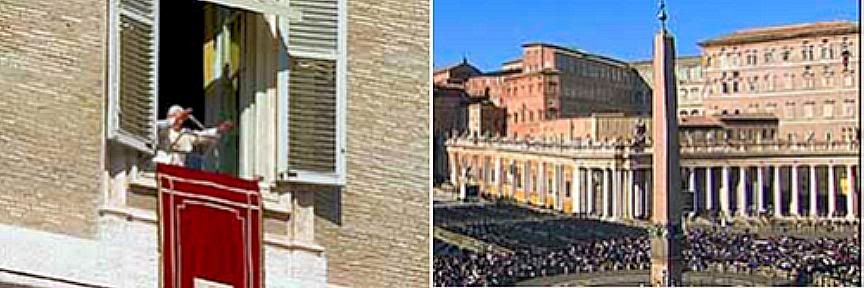
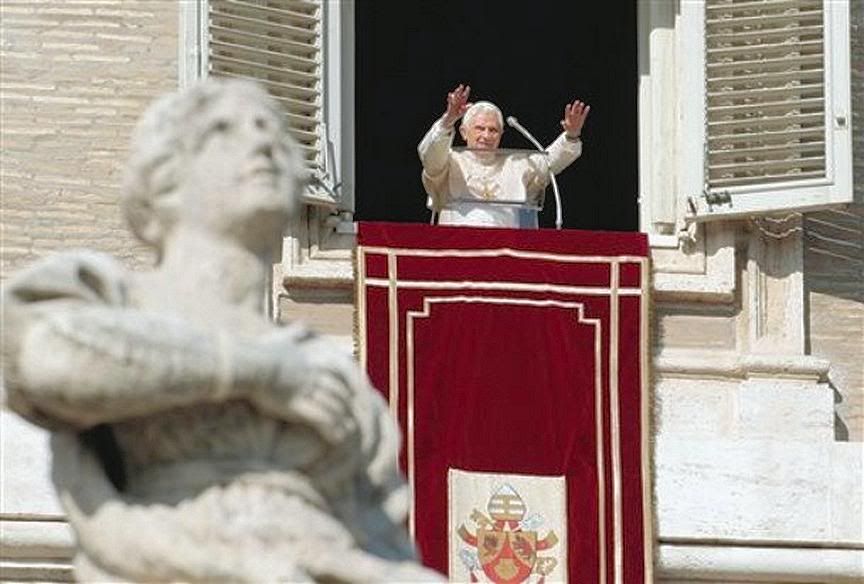 Pope Benedict: 'Charity is a gift we must use,
Pope Benedict: 'Charity is a gift we must use,
without which all other gifts are in vain'

November 13, 2011
"God summons every man to life and bestows on him a talent, while entrusting him with a mission", which is charity, Pope Benedict XVI said before the Angelus in St Peter’s Square today.
The Pope reminded the faithful of words by St. Gregory the Great, commenting on the Gospel today, that "Charity is the fundamental good that no one can fail to make use of and without which all the other gifts are in vain” and that therefore, only “by practicing charity, can we also take part in the joy of our Lord.”
Commenting earlier on the Second Reading in today's Mass, the Pope said it underlines that our earthly existence is marked by impermanence, and that therefore, our life should be lived as a “pilgrimage” with our eyes fixed on the ultimate goal, the God who created us.
In English, he said:
In today’s Gospel, the parable of the talents, Jesus invites us to reflect with gratitude on the gifts we have received and to use them wisely for the growth of God’s Kingdom. May his words summon us to an ever deeper conversion of mind and heart, and a more effective solidarity in the service of all our brothers and sisters. Upon you and your families I invoke the Lord’s blessings of wisdom, joy and peace!
After the prayers, the Holy Father had a number of special greetings in various languages.
In Italian, the Pope noted it was World Diabetes Day and prayed for those stricken by this illness. He also reminded the faithful that the Church in Italy celebrates Thanksgiving Sunday today
In German, the Pope referred to Sunday’s beatification of the priest and martyr Carl Lampert in Dornbirn, who was killed "in the dark time of National Socialism."
In Polish, he recalled that today, Poland observes a Day of Solidarity with the persecuted Church, with special prayers this year for the Church in Sudan.
And in French, he called on the faithful to pray for his forthcoming visit to Benin and urged solidarity with those who work for peace, justice and reconciliation on the continent of Africa.
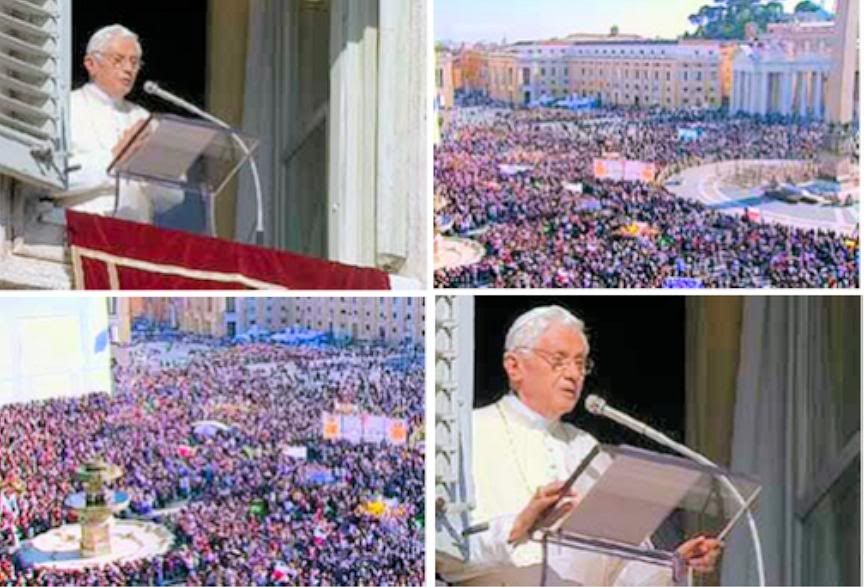
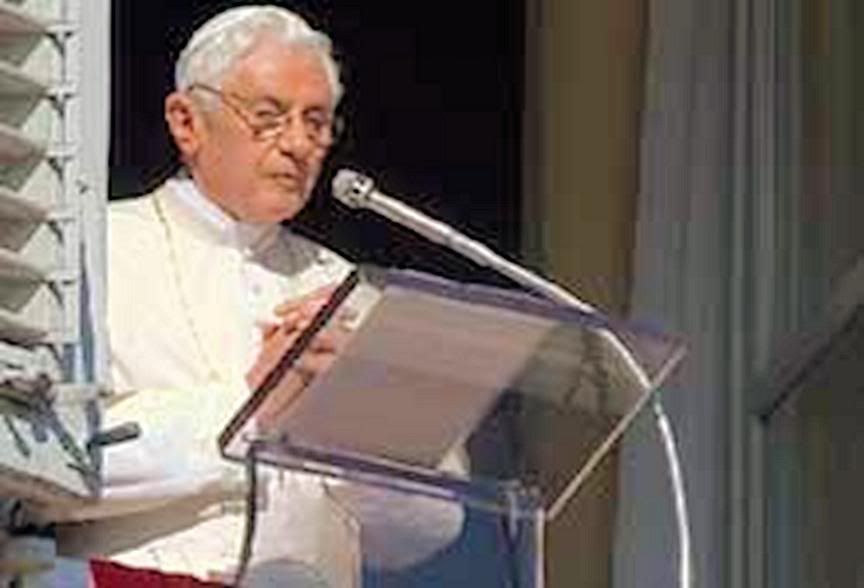
Here is a full translation of today's Angelus messages:
Dear brothers and sisters:
The Word of God this Sunday - the second to the last Sunday of the liturgical year - reminds us of the provisory nature of earthly existence and asks us to live it as a pilgrimage, with our eyes fixed on the goal - the God who created us - and because he created us for himself (cfr S. Agostino, Conf. 1,1),, he is our ultimate destiny and the sense of our living.
The obligatory passage to arrive at that definitive reality is death, followed by the Last Judgment. The Apostle Paul reminds us that "the day of the Lord will come like a thief in the night" (1 Ts 5,2), without warning.
Our knowledge of the glorious return of the Lord Jesus spurs us on to live in an attitude of watchfulness, awaiting his manifestation in the constant remembrance of his first coming.
In the famous parable of the talents, recounted by the Evangelist Matthew (cfr 25,14-30) – Jesus tells of three servants to whom the master, before leaving on a long trip, entrusts money. Two of them did well because they caused the gift they received to double in value. But the third servant hid the money he received in a hole.
Returning home, the master asks the servants to account for what he had entrusted to them, and while he was pleased at the first two, he was disappointed with the third.
In fact, that servant, who hid the talent given him without appreciating it, had nothing to show for it. He had acted as if the master would never return, as if there would not come a day when he would be asked to account for what he had done.
With this parable, Jesus wants to teach his disciples to use their gifts well: God calls each man to life and gives each one talents, entrusting these to him along with a mission to fulfill. It would be foolish to think that these gifts are owed to us, in the same way that failing to use them would be to fall short in carrying out the purpose of our existence.
Commenting on this Gospel account, St. Gregory the Great notes that the Lord does not fail to give each man the gift of his charity, his love. He writes: "It is therefore necessary, my brothers, that you take very good care to observe charity in every action that you do" (Homilies on the Gospels 9,6).
And after defining true charity as loving one's enemies as well as one loves one's friends, he adds: "If one lacks this virtue, he loses every good that he has - he is deprived of the talent he received and he will be thrown out into the darkness" (ibidem).
Dear friends, let us accept the invitation to watchfulness that Scriptures often calls us to. It is the attitude of he who knows that the Lord will return and will want to see in us the fruits of his love. Charity is the fundamental asset that no one can fail in causing it to bear fruit, and without which every other gift is in vain (cfr 1Cor 13,3).
If Jesus loved us to the point of giving his life for us (cfr 1Jn 3,16), how can we love God with all of ourselves and love each other truly from the heart? (cfr Jn 4,11) Only by practising charity, we too can take part in the glory of our Lord. May the Virgin Mary be our teacher of diligent and joyous watchfulness on our journey towards the encounter with God.
After the prayers, he said:
Dear friends,
Today is the World Day for Diabetes, a chronic illness which afflicts many persons, even young people. I pray for all these brothers and sisters and those who share their suffering every day, as well as the healthcare workers and volunteers who care for them.
Also today, the Church in Italy celebrates a Day of Thanksgiving. Considering the fruits of the earth that this year the Lord has given us once more, let us recognize that man's work would be in vain unless the Lord renders it fruitful. "Only with God is there a future in our fields".
While we give thanks let us also commit ourselves to respect the earth which God has entrusted to us.
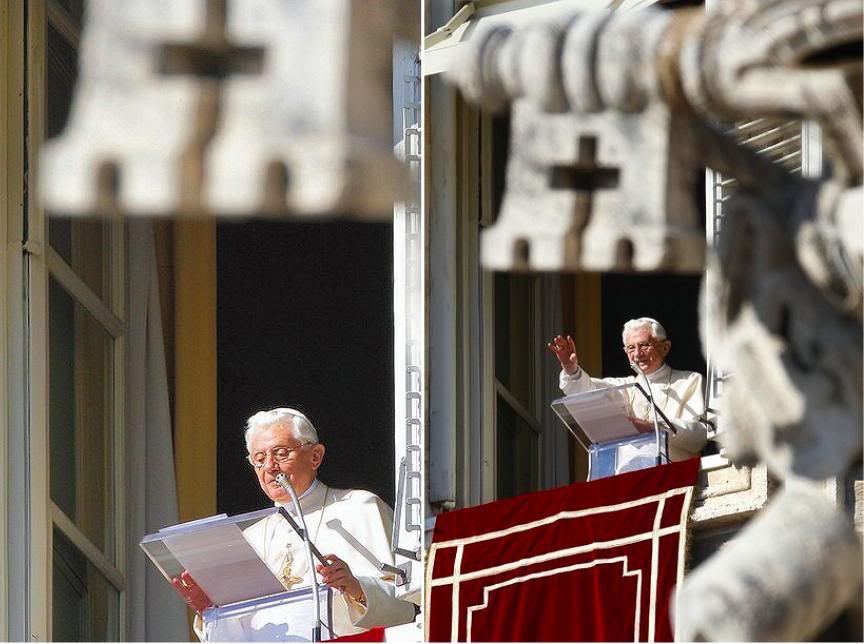
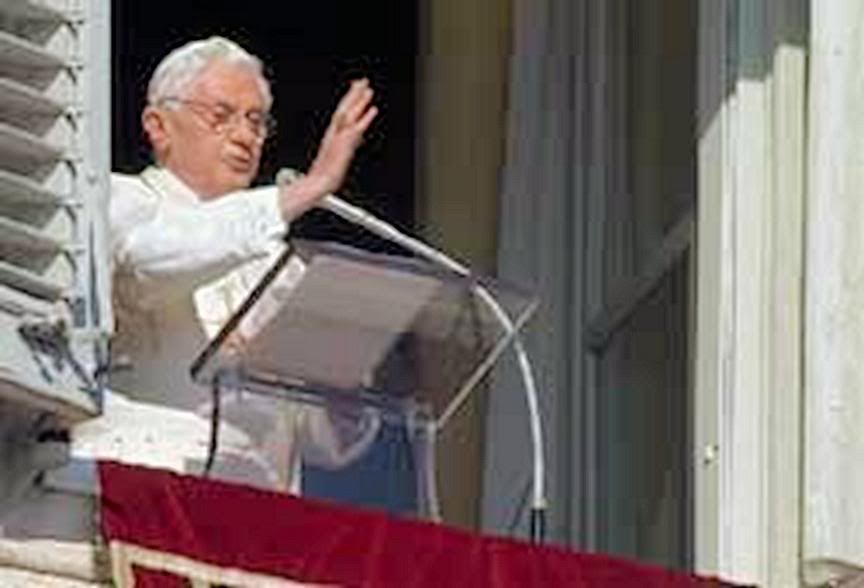
[Modificato da TERESA BENEDETTA 13/11/2011 19:01] |
| |
 14/11/2011 03:03 14/11/2011 03:03 |
|
| | | OFFLINE | | Post: 23.769
Post: 6.343 | Registrato il: 28/08/2005
Registrato il: 20/01/2009 | Administratore | Utente Master | |
|
 Not too early to think of Christmas:
Not too early to think of Christmas:
Pope will light the world's largest
Christmas 'tree' on December 7
by MAURO PIANTA
Translated from the Italian service of

TURIN, Nov.12 - By touching an icon on a Tablet PC, Benedict XVI on December 7 will light the world's largest Christmas 'tree' from his Vatican apartment.
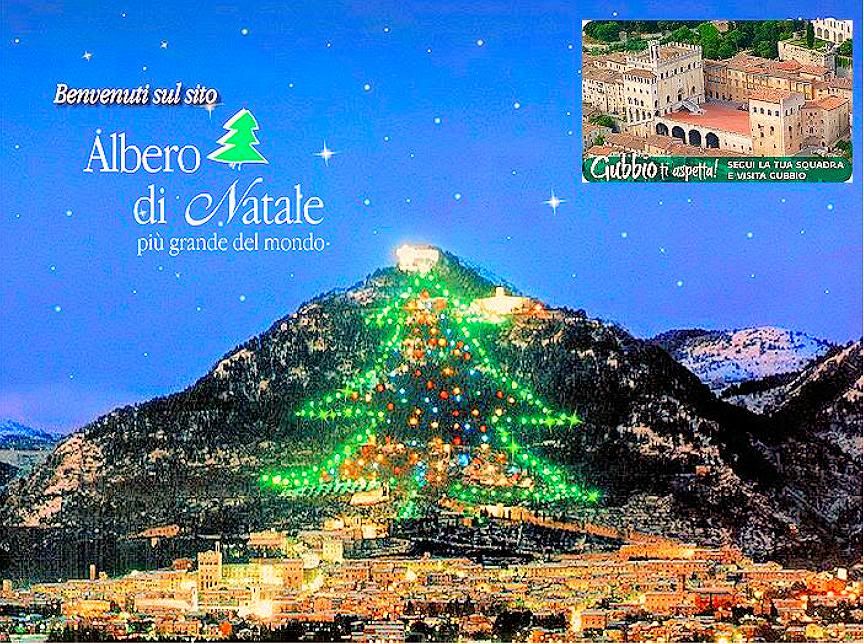 Gubbio's Christmas tree in 2010.
Gubbio's Christmas tree in 2010.
Gubbio's 'tree' is the outline of a Christmas tree traced by hudnrreds of colored electric lamps the south slope of Mt. Igino in Umbria, at the foot of which the city of Gubbio lies. Igino is an outlier of the Appenine range.
By arrangement with the Vatican television center, a PC application will allow the Pope to turn on a virtual awitch that will activate the actual light switches in Gubbio.
This was announced today at a news conference by the Commune and the Diocese of Gubbio, along with the committee of volunteers who have undertaken the 'Christmas tree' project for the past 30 years.
In Gubbio itself, the ceremonies will take place at the courtyard of the diocesan seminary starting at 5:45 p.m. The video-PC link to the Pope is scheduled for 6:30.
According to the Prefecture of the Pontifical Household, which communicated approval of the Pope's participation, the Pope will deliver greetings to the faithful of Gubbio and Umbria before turning on the lights for the tree.
A diocesan communique says that the Gubbio Christmas tree is in the Guinness Book of World Records for its size. The tree is outlined by 260 extra-large electric lamps connected by more than 8 miles of wiring, with about 1,500 plugs and sockets.
The comet-like outline above the tree is traced by 200 lamps occupying a thousand square meters. The entire tree is 650 meters (2086 ft - the tallest building in the world in Dubai is 2716 high, including its TV towers) in its vertical dimension, and 350 meters wide.
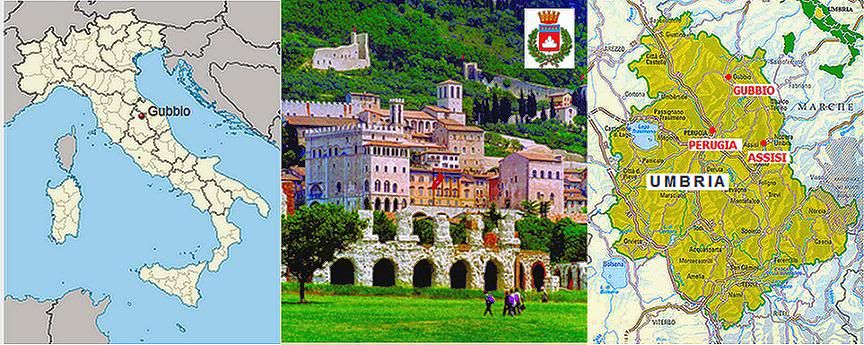 Gubbio was settled as early as the Bronze Age and was the center of pre-Roman Umbrian civilization. When it was conquered by the Romans in the second century BC, it became known as Iguvium. The 1st century AD Roman theater in Gubbio is the second-largest surviving theater of its kind.
Gubbio was settled as early as the Bronze Age and was the center of pre-Roman Umbrian civilization. When it was conquered by the Romans in the second century BC, it became known as Iguvium. The 1st century AD Roman theater in Gubbio is the second-largest surviving theater of its kind.
Gubbio became an important center in the Middle Ages when its leading families were Guelphs, supporters of the papacy against the Ghibellines who supported the Holy Roman Emperor in the ongoing dispute for temporal power at the time. Today, quite a number of residences in Gubbio date to the 14th and 15th centuries.
Earlier, however, around 1206, Francis of Assisi, shortly after his conversion, lived in Gubbio briefly, nursing lepers. His brief stay there occasioned the legend of Francis and the wolf of Gubbio - a ferocious animal that had been savaging other animals and killing people. Hearing about this, Francis volunteered to go and see the wolf, whom he approached with the sign of the Cross and calling him 'Brother Wolf". To the surprise of everyone the wolf came to Francis and behaved like a lamb, putting his paw into Francis's hand when the latter asked him to seal the promise he had asked of the wolf - if he left the people and other animals alone, the people of Gubbio would see to it that he never lacked for food to eat everyday. It is said the wolf lived another two years and kept his part of the pact.
In 1631, Gubbio became one of the Papal States, but it devolved to Italy after the abolition of the Papal States in 1861.[Modificato da TERESA BENEDETTA 15/11/2011 13:01] |
| |
 14/11/2011 13:37 14/11/2011 13:37 |
|
| | | OFFLINE | | Post: 23.770
Post: 6.344 | Registrato il: 28/08/2005
Registrato il: 20/01/2009 | Administratore | Utente Master | |
|
 This is about one of the biggest priest scandals brought to light recently that seems to be resolving as it should, but is yet another tale of long-standing abuse by priests and lay teachers alike at a Catholic school. I have not been posting anything about it because I was waiting for a report that would put the major facts together instead of just noting day-to-day developments. And here it is.
London's Ealing Abbey to hand over
This is about one of the biggest priest scandals brought to light recently that seems to be resolving as it should, but is yet another tale of long-standing abuse by priests and lay teachers alike at a Catholic school. I have not been posting anything about it because I was waiting for a report that would put the major facts together instead of just noting day-to-day developments. And here it is.
London's Ealing Abbey to hand over
control of Benedictine school
after two decades of sex abuses
By MADELEINE TEAHAN

November 9, 2011
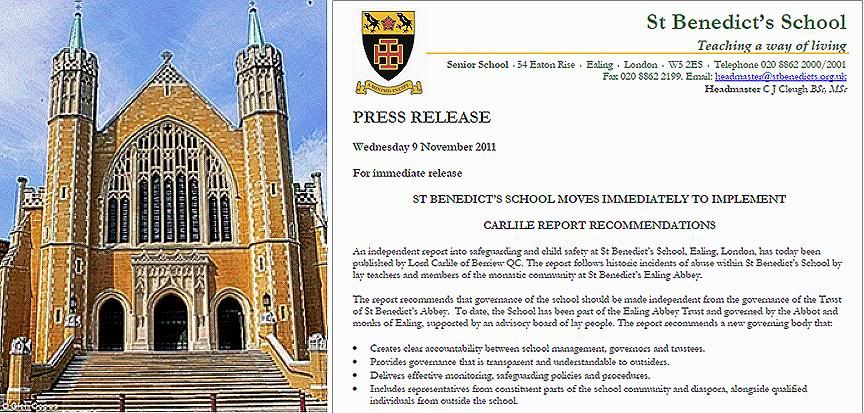
A report commissioned by St Benedict’s Catholic Independent School in Ealing, west London, has concluded that monks from the neighbouring Ealing Abbey should no longer be involved in the running of the school, following allegations of clerical sex abuse said to have occurred over the past 20 years.
Lawyer Alex Carlile (lor Carlile of Berriew) found 21 cases of abuse since 1970 at St. Benedict's School, which is run by the Ealing Abbey monastery. The private Catholic school, whose students are aged 3-18, is now fully coed but was mostly male for decades. Former pupils have made allegations of abuse dating back to the 1960s.
At a press conference on Wednesday Lord Carlile said that in essence, his recommendations “remove all power over the school from the abbey, while still retaining the Benedictine connection which is important to many parents”.
His report said the existing trust structure “lacks elements of independence, transparency, accountability, diversity and is drawn from too narrow a group of people”.
Chris Cleugh, headmaster of St Benedict’s School, said that Lord Carlile’s recommendations would be implemented by September next year, and a new system of governance would be established to separate the abbey from the running of the school.
He said: “Past abuses at the school have left a terrible legacy for those affected and have tarnished the reputation of St Benedict’s. On behalf of all at the school, I offer my heartfelt apology for past failures. The school could have, and should have, done more.”
The report follows the jailing in October 2009 of Fr David Pearce, who admitted indecently assaulting pupils between 1972 and 2007. Fr Pearce was headmaster at the school until 1993 and afterwards resided at Ealing Abbey.
Scrutiny of the school and abbey has intensified since the disappearance of Fr Laurence Soper in March following allegations of abuse. Fr Soper was bailed from Rome to a west London police station earlier this year but failed to turn up and has been missing ever since, causing further embarrassment for the abbey. [Soper, 80, was abbot of Ealing Abbey from 1991-2000, and accused of sexual abuses dating back 20 years.]
Speaking at the press conference, Lord Carlile said Fr Soper’s disappearance had caused difficulties for the investigations into St Benedict’s School.
He said: “I would encourage Laurence Soper to surrender himself to the police… He may feel he has a personal and ethical duty to do so.”
The Vatican ordered an Apostolic Visitation of Ealing Abbey in a historic intervention as the scandal intensified. Auxiliary Bishop John Arnold of Westminster and Fr Richard Yeo, abbot president of the English Benedictine Congregation, have reported separately to the Vatican.
Bishop Arnold said that he welcomed Lord Carlile’s report and that he had appealed to the Holy See to make public the content of the visitation’s findings. The Holy See has agreed to look sympathetically at his request.
Lord Carlile expressed concerns about possible conflicts of interest stemming from Fr Yeo’s involvement with the Apostolic Visitation, and he said that individuals with no connection to St Benedict’s school should conduct future visitations.
Mr Cleugh made clear that some connection between the abbey and the school would be retained on a day-to-day basis. He said that three abbey monks were working at the school, who were much “revered” by parents, pupils and teachers. But Mr Cleugh asserted that the monks are answerable to him and are subject to the same safety checks as all other members of staff.
Lord Carlile said he hoped the change would provide a “template” for the governance of other Benedictine schools in Britain.
If something like this were uncovered in Ireland at this time, bishops and priests would likely be at risk of being dragged out of their manses and lynched!
This, just as Pennsylvania State University has fired its president and its sports-legend football coach for failing to call the cops on an assistant coach who had been molesting young boys for decades and had even set up a children's charity that apparently provided him with a ready pool of victims. So far, some 18 boys have complained, and this is just beginning. It's a sordid story, but can you imagine if this had taken place in a Catholic institution? The additional horror in the Penn State story is that otherwise upstanding people who should have known better chose to close their eyes to the scandal all because they did not want anything to endanger the school's moneymaking football program in any way...
[Modificato da TERESA BENEDETTA 14/11/2011 17:34] |
| |
 14/11/2011 16:52 14/11/2011 16:52 |
|
| | | OFFLINE | | Post: 23.771
Post: 6.345 | Registrato il: 28/08/2005
Registrato il: 20/01/2009 | Administratore | Utente Master | |
|
 Monday, Nov. 14, 33rd Week in Ordinary Time
Monday, Nov. 14, 33rd Week in Ordinary Time ST. GERTRUDE THE GREAT (Germany 1256-1302), Benedictine Nun and Mystic
ST. GERTRUDE THE GREAT (Germany 1256-1302), Benedictine Nun and Mystic
She was the first subject in October 2010 of the Holy Father's catechetical cycle on great female Christian figures of the Middle Ages
www.vatican.va/holy_father/benedict_xvi/audiences/2010/documents/hf_ben-xvi_aud_20101006...
One of the great mystics of the Middle Ages, her spiritual life was a deeply personal union with Jesus and his Sacred Heart, leading her into the very life of the Trinity. Gertrude lived the rhythm of the liturgy, where she found Christ. In the liturgy and Scripture, she found the themes and images to enrich and express her piety. There was no clash between her personal prayer life and the liturgy.
Readings for today's Mass:
www.usccb.org/bible/readings/111411.cfm
AT THE VATICAN TODAY
The Holy Father met with
- Cardinal Leonardo Sandri, Prefect of the Congregation for Oriental Churches
- Mons. Giuseppe Bertello, President of the Pontifical Commission for Vatican City State (SCV) and of the SCV Governatorate
- H.E. Alfonso Rivero Monsalve, Ambassador from Peru, on his farewell visit.
The Vatican Press Office held a briefing on the Holy Father's apostolic visit to Benin on Nov. 18020.
 Vatican Radio is rightly keeping track of Italy's current political and financial-economic crisis:
Mario Monti acts to form
Vatican Radio is rightly keeping track of Italy's current political and financial-economic crisis:
Mario Monti acts to form
a new government for Italy

Mov. 14, 2011
Mario Monti is negotiating to form a new government in Italy and implement austerity measures. Italian President Giorgio Napolitano announced the appointment of the economist yesterday.
Monti, a former European Union commissioner, has pledged to work 'with urgency' to restore the country's finances. [If he succeeds to put together a cabinet acceptable to a parliamentary majority, he will automatically be named the next Prime Minister of Italy, the world's eighth largest economy.]
“It is not going to be easy, but behind him he has got the markets, as it were, on his side, and the European Union, the European Central Bank. So, he will have, I think considerable - I wouldn’t say powers - but authority to push through some measures that will be rather unpopular”, says London Financial Times Rome Correspondent Guy Dinmore about the road ahead for Monti.
He also told Vatican Radio that it was inevitable that Italy had to look outside Parliament and government for someone to rescue the country from this crisis.
[Former Prime Minister Silvio Berlusconi resigned Saturday as he promised, after the Italian Parliament passed the IMF-endorsed austerity package his government had proposed as a first step to deal with Italy's debt crisis. The billionnaire businessman, Italy's richest man, was a leading protagonist in Italian politics for 17 years, and served two separate terms as Prime Minister longer than anyone else in postwar Italy (the full five years the first time, and 3-1/2 years of the term that ended with his resignation on Saturday]
- On the heels of the Vatican-sponsored first international conference for researchers on adult stem-cell therapy, here is some news that seems emblematic of the poor prospects that have dogged embryo stem-cell research all these years despite the hype they have been getting from the US media. Here's the AP report:
Geron halting stem cell research
and laying off staff

TRENTON, N.J., Nov. 14 (AP) — The company doing the first government-approved test of embryonic stem cell therapy is discontinuing further stem cell work, a move with stark implications for a field offering hope of future medicines for conditions with inadequate or no current treatments. [Not at all, you ideolog! Stem cells are not generated only by embryos, and every reporter ought to know that, but you choose to completely ignore the successful reality of adult stem-cell research!]
Geron Corp., a pioneer in stem cell research that has been testing a spinal cord injury treatment, said late Monday that it's halting development of its stem cell programs to conserve funds. It is seeking partners to take on the programs' assets and is laying off much of its staff...
You can read the rest of the report here
www.thenewstribune.com/2011/11/14/1906341/geron-halting-stem-cell-research.html?story...
The article is most dishonest in that while it hails all the great potential of using embryonic stem cells for future therapies, it makes not a single mention at all of stem cells derived from adult tissues. Let alone that there have been far more successful clinical trials, and at a more advanced stage of testing, using adult stem-cell therapy than embryonic stem cells.
Which begs the question of why these scientists would persist in using embryos to generate stem cells when, APART FROM THE ETHICAL QUESTION, there will always be a limit to the number of embryos they can use (most countries now legislate against the number of embryos that IVF clinics can use for women attempting pregnancy, so the clinics no longer hyperstimulate women to produce as many eggs as they can in one cycle to get as many embryos as they can, since they can only transfer 1-3 embryos.)
On the other hand, the source of adult stem cells is virtually inexhaustible, often from the patient himself/herself. And so it seems to me that the persistence and insistence on embryonic stem-cell research is almost purely for ideological rather than scientific reasons.
Unsolved crimes at the Vatican
- A real-life drama that far outdoes the most compelling police thriller you could see on TV shows like Law and Order took place at the Vatican long before Benedict XVI became Pope, but it is now being laid at his doorstep. He has been asked by the mother of a young Swiss Guard to re-investigate a rather sordid case which the Vatican at the time concluded was a double murder and suicide committed by the young man. At the time, the secular press called the Vatican investigation a whitewash. Read what the Newsweek/Daily Beast correspondent in Rome writes about the case today:
http://www.thedailybeast.com/articles/2011/11/14/vatican-murder-mystery-was-it-a-gay-love-triangle.html
The previous Pontificate was so long that among its many events were at least three sensational crimes involving the Vatican somehow (all these coming after the 'mystery' that many authors have insisted on seeing in the sudden death of John Paul I after only 33 days as Pope). The two others besides the Swiss Guard death triangle were:
1) The collapse of a major Italian bank, the Banco Ambrosiano, in which the Vatican bank IOR was the major stockholder, with the supposed 'suicide by hanging' in London's Blackfriar Bridge of one of the bank executives involved, and IOR having to pay out $250 million to restitute bank customers; and
2) The disappearance in 1983 of Emanuela Orlandi, a 15-year-old citizen of the Vatican who has never been found, and whose disappearance has been variously theorized as a hostage situation intended to ransom Ali Agca (who claims that she was brought to a monastery in a central European country where she is now a nun, but who can take Agca's word for anything?); or as a way to pressure the Vatican to pay the Mafia for its losses in the Banco Ambrosiano collapse. (It's a very confusing case, and some idea of it may be found in the Wikipedia entry on Orlandi.)
In any case, the Orlandi family, who are Vatican citizens, says they were asked by the Vatican not to speak to anyone about the case because it might endanger the girl's life if she was still alive and stymie the investigation. Now, after 28 years, her older brother has prepared a petition to Benedict XVI to reopen the investigation so that the family can have closure, claiming that in the past, Vatican investigators seemed to abandon every lead they received whenever they seemed to be getting close, and that the family had personally written John Paul II to order the investigation resumed, but they never got any response from the Vatican. He has placed the brief text of his petition online to ask for sympathizers to add their signatures. He explains that he feels called on to do this now that their father has died and he has become the head of the family.
It is, of course, not fair to Benedict XVI to have all these old cases left unresolved from decades ago, now coming to roost at his door (the worst being the pedophile scandal), even though as Orlandi's brother says, it is because this Pope has a 'different' attitude. (Perhaps the people around John Paul II chose not to have him involved in the investigation of any of the cases.)... And yet, somehow, if these crimes had happened with Benedict XVI as Pope, the media would doubtless blame him for everything!
We can only pray for all the victims in these tragedies and hope the Holy Father can help bring some resolution to their families.
[Modificato da TERESA BENEDETTA 15/11/2011 05:08] |
| |
 14/11/2011 19:00 14/11/2011 19:00 |
|
| | | OFFLINE | | Post: 23.772
Post: 6.346 | Registrato il: 28/08/2005
Registrato il: 20/01/2009 | Administratore | Utente Master | |
|
 A belated post, and I am grateful to Lella's blog for the link it provided...
The Pope's pastoral visits in 2012:
A belated post, and I am grateful to Lella's blog for the link it provided...
The Pope's pastoral visits in 2012:
He has agreed to visit Arezzo
but a date has not been set

AREZZO, Nov. 10 - It seems now like a papal visit to this city next year is one step away.
Mons. Riccardo Fontana, Bishop of Arezzo, said that he had renewed the invitation to the Pope when he spoke to him at the recent forum sponsored by the Pontifical Council Cor Unum.
[Arezzo, located about 80 kms southeast of Florence, was one of the 12 major cities of Etruria, the sophisticated pre-Roman civilization centered in what is now the region of Tuscany. Arezzo became one of the great centers of medieval civilization, the birthplace, among others, of Petrarch, Pietro Aretino, Piero della Francesca and Giorgio Vasari.]
Arezzo's invitation is tied to to the millenary year to be celebrated in 2012-2013 by the Camaldoli Benedictines, referred to often as the Camaldolesi. [Camaldoli is the mountain site near Arezzo where St. Romuald founded the first Sacred Hermitage of the order he began in 1013 as a reformed branch of the Benedictines, integrating the elements of hermit living into the life of a monastic community.]
Mons. Fontana said the Pope assured him of his readiness to lend his presence to this truly exceptional event for the Church of Arezzo.
But the bishop said the date is yet to be fixed, since the Pope's travel calendar for 2012 has yet to be finalized. His pastoral visits within Italy usually alternate with his apostolic visits abroad. So far, the only probable papal trip for 2012 publicly mentioned by the Vatican is a likely visit to Mexico and Cuba in the spring of 2012.
Before he became Pope, Cardinal Joseph Ratzinger had visited Arezzo a few times, usually as a guest at the Shrine of La Verna, where St. Francis received the stigmata.
[Modificato da TERESA BENEDETTA 14/11/2011 22:34] |
| |
 14/11/2011 20:57 14/11/2011 20:57 |
|
| | | OFFLINE | | Post: 23.773
Post: 6.347 | Registrato il: 28/08/2005
Registrato il: 20/01/2009 | Administratore | Utente Master | |
|
 As the bishops of the United States begin a year of ad-limina visits, the annual fall assembly of the USCCB takes place at a time of an increasing standoff between the US Church and the Obama administration on many fronts, from assaults on religious freedom and traditional marriage, to selective discriminatory regulations that force out Catholic health institutions from carrying out the work they have done for decades to the defense of traditional marriage. It is very encouraging that the president of the USCCB, Archbishop Timothy Dolan of New York, is a solidly orthodox, pragmatic and straight-talking bishop who is on the same wavelength as the Holy Father.. Unusually, Vatican Radio reports from the United States.
USCCB Plenary:
As the bishops of the United States begin a year of ad-limina visits, the annual fall assembly of the USCCB takes place at a time of an increasing standoff between the US Church and the Obama administration on many fronts, from assaults on religious freedom and traditional marriage, to selective discriminatory regulations that force out Catholic health institutions from carrying out the work they have done for decades to the defense of traditional marriage. It is very encouraging that the president of the USCCB, Archbishop Timothy Dolan of New York, is a solidly orthodox, pragmatic and straight-talking bishop who is on the same wavelength as the Holy Father.. Unusually, Vatican Radio reports from the United States.
USCCB Plenary:
Reclaiming the truth

November 14, 2011
The United States Conference of Catholic Bishops Plenary Assembly got underway today in Baltimore. The three-day meeting is the first under the Presidency of Archbishop Timothy Dolan of New York and with the participation of Archbishop Viganò, the newly appointed Apostolic Nuncio to the US.
In his opening address, Archbishop Dolan stated that the bishops' “most pressing pastoral challenge today is to reclaim that truth and restore the credibility, the beauty of the Church”, to re-engage with people who have fallen away from the Church and from practising the faith.
He said: “They drift from her, get mad at the Church, grow lax, join another, or just give it all up. If this does not cause us pastors to shudder, I do not know what will. The reasons are multiple and well-rehearsed, and we need to take them seriously”.
Archbishop Dolan went on to note: “Two simple observations might be timely as we as successors of the apostles embrace this urgent task of inviting our people and our world to see Jesus and His Church as one. First, we resist the temptation to approach the Church as merely a system of organizational energy and support that requires maintenance”. [Benedict XVI's message to the Church in Germany!]
The second he said concerns the sinfulness of Church members which however, “reminds us precisely how much we need the Church. The sinfulness of her members is never an excuse, but a plea, to place ourselves at His wounded side on Calvary from which flows the sacramental life of the Church”.
In fact, the focus of the autumn session is on internal Church matters, which has drawn the criticism of some mainstream media who expressed disappointment at the Church leaders' failure to put economic justice to the forefront. [Because, all you ignorant and insensitive journalists in the MSM, the Church's primary mission is spiritual - that if Christ's message is truly internalized by Christians, who will then be motivated by genuine charity, then the practical problems of daily life will be better confronted by each individual, and ultimately by society.]
Los Angelus Auxiliary Bishop Gabino Zavala, who heads the USCCB communications committee, explains why looking inward is important before reaching out to broader society, “We feel a need to look at some issues that are important to us as a conference”. [That's a rather superficial view. What's important to the bishops as a conference ultimately has to be what's important to every individual bishop in terms of how he can best carry out his pastoral tasks, which are primarily spiritual. These tasks necessarily become practical when the bishop(s) has/have to confront flagrant cases of injustice to the people in general and to the Church in particular, in the way the Obama administration has been marginalizing Catholic institutions in the implementation of general health care, to take one example. And in the example Mons. Zavala cites below:]
Bishop Zavala notes how not all items on the agenda are looking inward; “one of the key issues that we will be looking at is the religious liberty. We are forming a new task force on religious freedom… because the bishops are concerned that the freedom of religion – what we call our first freedom – is being eroded. It’s not just a matter that people aren’t able to practise their own faith but also that we as a Church have a right to define what our ministry is and who are ministers are”.
[Modificato da TERESA BENEDETTA 14/11/2011 21:07] |
| |
 14/11/2011 22:18 14/11/2011 22:18 |
|
| | | OFFLINE | | Post: 23.774
Post: 6.348 | Registrato il: 28/08/2005
Registrato il: 20/01/2009 | Administratore | Utente Master | |
|
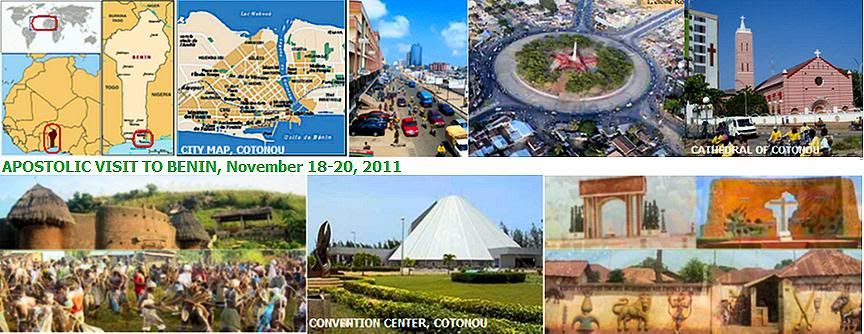 NB: Benin is also celebrating the 150th anniversary of the country's evangelization.
The Pope's trip to Benin:
NB: Benin is also celebrating the 150th anniversary of the country's evangelization.
The Pope's trip to Benin:
A physical trial for Benedict, 84
Translated from the French service of

VATICAN CITY, Nov. 14 (AFP) - Pope Benedict XVI, aged 84, is facing a trying three-day trip to Benin, even as he has been showing some signs of fatigue this year without lightening his work schedule.
Pope for six and a half years now, the Sovereign Pontiff who leads 1.12 billion Catholics, will be visiting just one country, Benin. He will spend two nights in the capital of Cotonou, and his only 'inland' travel will be a short visit to Ouidah 40 kms. away.
"There is nothing new, nothing to add [about the health of the Pope)," said Fr. Federico Lombardi, Vatican press officer, who seemed almost irritated by questions about the Pope's health. "He has no outstanding medical problem".
Meanwhile, the Vatican is working on a possible papal visit to Mexico and Cuba next spring - which indicates, Lombardi told AFP, that "the Pope has plans and projects in hand, and that he has the energy for them".
Lombardi underscored that Papa Ratzinger "carried out all his commitments in a rather heavy agenda this year with total presence, ability and dignity".
Last summer, during the World Youth Day celebrations in Madrid, he kept to an exhausting schedule in the Spanish capital's oven-hot summer, presiding at a prayer vigil and Mass the next day with at least 1.5 million young people at each event.
When he visited his native country, Germany, last September, he delivered more than twenty speeches in four days, visiting Berlin, Erfurt, Eisenfeld and Freiburg.
But on October 16, for the first time, he used the Popemover, a rolling platform pushed by two aides, to traverse the long processional route from the sacristy of St. Peter's Basilica to the main altar.
Although this was announced the day before by Fr. Lombardi, it created some alarm about the Pope's health, particularly because it recalled John Paul II's use of the same device starting in 2000 when the effects of Parkinson's disease had started to affect his mobility.
The usually well-informed site Vatican Insider has since reported that Benedict XVI suffers from mild arthritis, particularly affecting his right hip, which causes him discomfort when he walks great distances.
"What one observes in the Pope has to do with age rather than with illness," said Vatican expert Sandro Magister.
It is known that the Pope has a heart condition [which has apparently been under medical control since he was diagnosed in the early 1990s]. So, in preparing for a probable trip to Mexico, he will not be visiting Mexico City which is at 12,000 feet altitude, contra-indicated for someone his age with a cardiac problem.
The Pope's personal physician, cardiologist Patrizio Polisca, who is also the head of the Vatican's health service, travels with him everywhere, and part of pre-visit arrangements for any Pope is to facilitate prompt liaison by his doctors with an on-site medical team with full emergency facilities.
One of his associates note that "it is always difficult for someone his age to adjust to new surroundings, sleep in a strange room, without his familiar reference points". {Since the Pope lives very simply, I think it should not be a problem for the Nunciatures that expect to host him to configure the bedroom assigned to him in a way that is as much like his bedroom at the Vatican, with a similar bed and other room furniture as he has at home. I imagine most of them would have to do some renovation anyway for him - they might as well recreate the room he is used to. ]
It is said Benedict XVI is a very organized person who observes a regular schedule which allows him brief rest pauses during the work day, and he also avoids exerting himself needlessly.
These considerations probably explain why in the past two years, he has not gone to the Italian Alps for a summer break, preferring to spend the whole summer instead at the papal summer residence in the hills of Castel Gandolfo not far from Rome.
Benin: A unique example of
the Catholic Church actively aiding
a peaceful transition to democracy
by ANDREA TORNIELLI
Translated from the Italian service of

November 14, 2011
In a few days, Benedict XVI will be leaving for Benin on the second African trip of his Pontificate. At the Angelus yesterday, the Pope asked the faithful to pray for the success of the trip and for the people of Africa.
This afternoon at 5 pm. a book by Susanna Cannelli entitled Cattolici d'Africa: La nascita della democrazia in Benin (The Catholics of Africa: The birth of democracy in Benin) was presented at the Sala Marconi of Vatican Radio.
Participating were Mons. Barthelemy Adoukonou, secretary of the Pontifical Council for Culture and a native of Benin; the president of Vatican City Governatorate, Mons. Giuseppe Bertello, who had been the Nuncio in Benin during the difficult years of the transition to democracy of the former French colony known then as Dahomey; and Professors Agostino Giovagnoli and Émile Poulat, of the École des Hautes Etudes en Sciences Sociales (the French academy of higher learning in the social sciences).
After 1989 and the fall of the Communist regimes in East Europe, "Africa, which had been a ground of confrontation among the great powers, started distancing itself from Europe", writes historian Andrea Riccardi in the preface to the book.
A similar distancing from Europe is described by Riccardi, founder of the Sant'Egidio Community, in Latin America, though perhaps less perceptible.
A similar distancing from the Catholic Church also appeared to take take place - at least in the public perception - after the first part of John Paul II's Pontificate, who had deliberately sought to exert a strong geopolitical valency to counteract atheist totalitarian regimes, and the Church played an important role in both Africa and Latin America.
But this distancing from the Catholic Church may not all be true if we consider what happened in Benin. Beyond all simplifications the country has represented an important model for all Africa, a model that is worth knowing and studying in the West.
It is a model in which the Catholic Church was a protagonist, along with the best forces in the nation, in Benin's progress towards democracy.
Catholic missionaries who, until the 200th century had little success in Benin in terms of gaining converts and adherents, played a fundamental role in the process, if only because their positions never coincided with colonial policies that exploited the native populations.
This consideration also explains why in sub-Saharan Africa, the number of Catholics increased from scarcely two million at the start of the 20th century, to 164 million at the turn of the millennium.
After it gained independence from France in 1960, Dahomey-Benin underwent a succession of coups d'etat and instability (In the twenty years till 1972, the country had 11 different chiefs of state, five constitutions, dozens of putsches).
The last coup d'etat took place in October 1972 which brought Mathieu Kérékou to power. His regime would last 18 years, and Kerekou who came from the military would be called 'the chameleon' for his ability to adapt.
A brief nationalist period was followed by a phase of radicalization of his socialist regime. His political trajectory ended with timid pragmatic measures that tended to mitigate socialist options leading to a crisis that caused his fall from power and the transition to democracy in which he remained a protagonist.
The other lead actor in Benin's recent history is Archbishop Isidore de Souza, who as the coadjutor bishop of Cotonou, also carried out the 'political' role of president of the bishops' conference. In effect, he was called to save the nation from civil war and the political, economic and financial crisis into which the nation was thrown.
Papa Wojtyla, who visited Benin twice, in 1982 and 1993, certainly was not sympathetic to bishops taking any political roles. But the Holy See, through its Nuncio, Mons. Bertello, did not hinder Mons De Souza, allowing him to carry out a valuable service to the nation, especially in playing the role of interlocutor with Kerekou during the most delicate phase of the transition to democracy.
The Church, which during the 1970s had been the object of repression and a denigratory campaign by Kerekou's regime, nonetheless was never considered irrelevant or marginal to the affairs of government. It was consistent in denouncing corruption and the need for reforms.
And Mons. Souza was able to be an authoritative and acknowledged go-between, far beyond the limits of the Church.
The National Conference in Cotonou which took place in February 1990 for ten days - 'ten days that changed Benin' - ended up 'ferrying' the nation towards democracy without any bloodshed, with an important contribution by the Catholic Church. An example that would be followed, though not always successfully, in successive months in other African countries (Gabon, the former French Congo, Togo, Mali, Niger and Zaire).
And even if Benin's experience remains somewhat unique, it continues to be a practical model for democratic transition in the context of the continent' widespread political instability.

[Modificato da TERESA BENEDETTA 15/11/2011 05:24] |
| |
 15/11/2011 01:41 15/11/2011 01:41 |
|
| | | OFFLINE | | Post: 23.775
Post: 6.349 | Registrato il: 28/08/2005
Registrato il: 20/01/2009 | Administratore | Utente Master | |
|
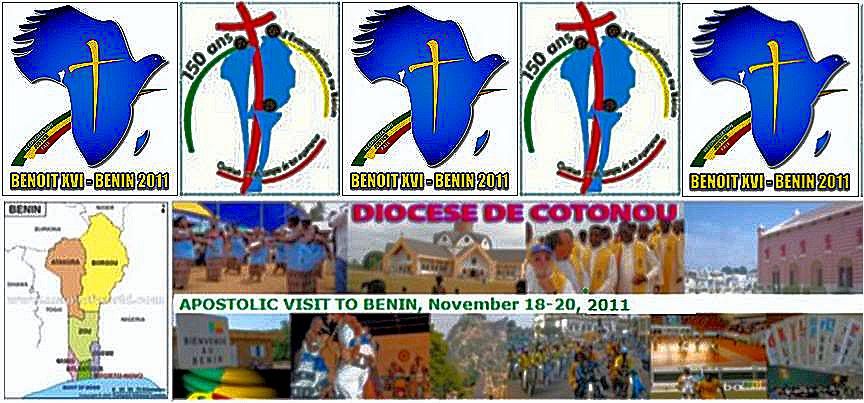 My silent applause to the Diocese of Cotonou for deciding to use the unusual photograph of the Pope used by the German bishops' conference for all their promotional materials on the Pope's visit last September. It's a very engaging photograph, and this week, it is displayed all over Cotonou, capital of Benin.
WELCOME TO COTONOU
My silent applause to the Diocese of Cotonou for deciding to use the unusual photograph of the Pope used by the German bishops' conference for all their promotional materials on the Pope's visit last September. It's a very engaging photograph, and this week, it is displayed all over Cotonou, capital of Benin.
WELCOME TO COTONOU
'NAKAYO' is the native word for 'Welcome'. The poster also reads , under the welcome - 'Reconciliation, justice and peace' in French, the official language of Benin. The motto was the theme of the Special Synodal Assembly on Africa in 2009, of which Pope Benedict will be delivering his Post-Synodal Apostolic Exhortation to the bishops of Africa on this visit to Benin.
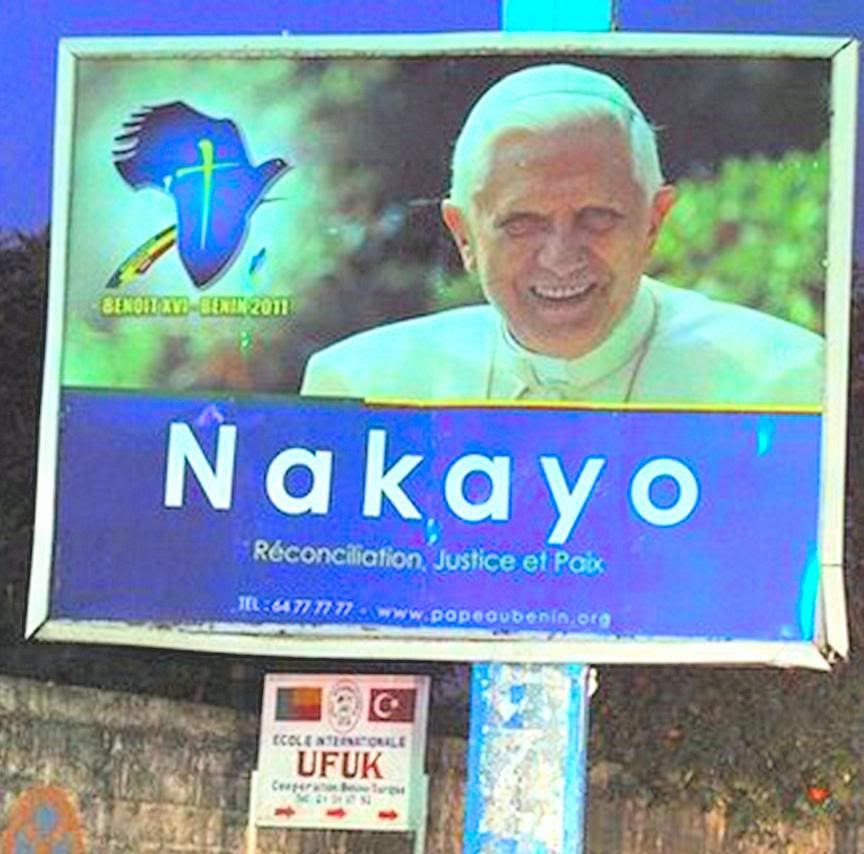
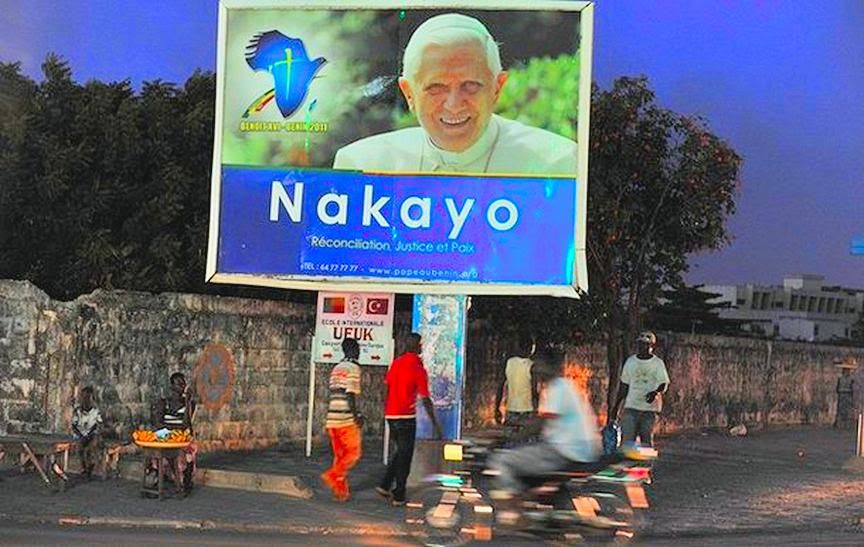
One billboard shows the Pope with Benin President Yayi, and the greeting in French says: President Boni Yayi and all the people of Benin welcome the Holy Father".
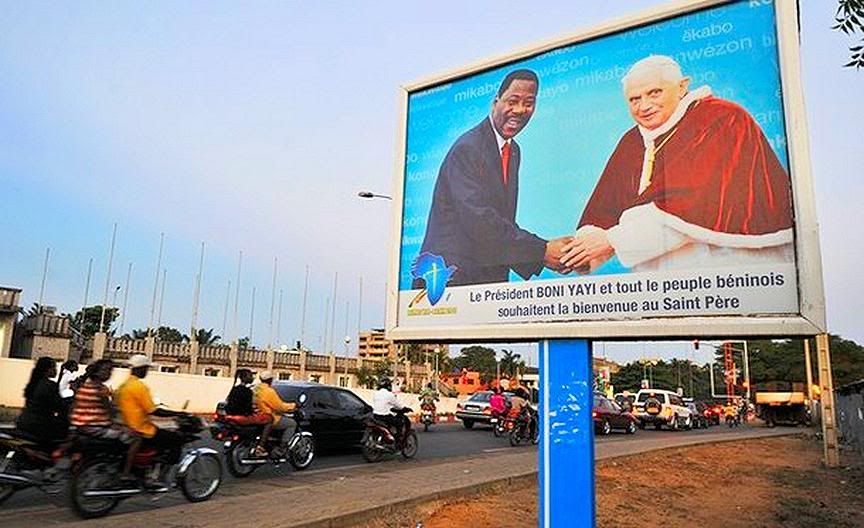
And outside a church in Cotonou, a sign that reads: "Enroll here for the Volunteers' Club", while a few destitute persons sit on the pavement outside.
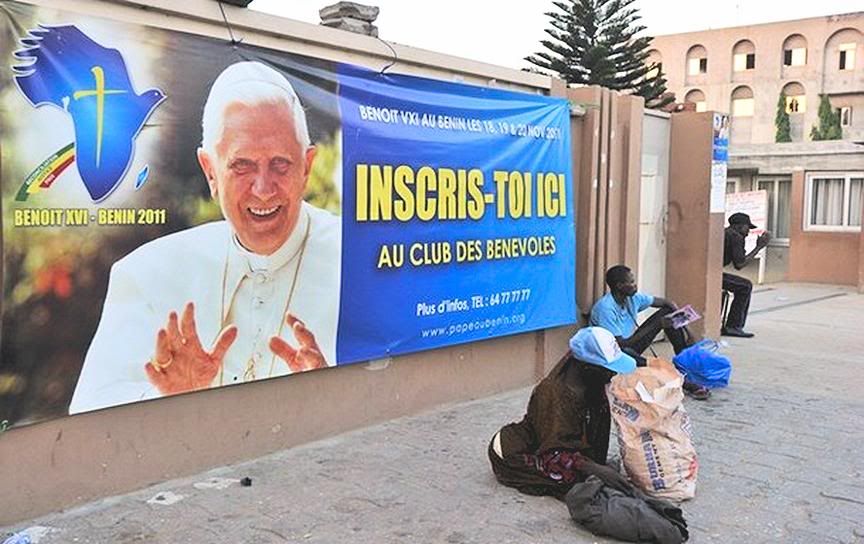
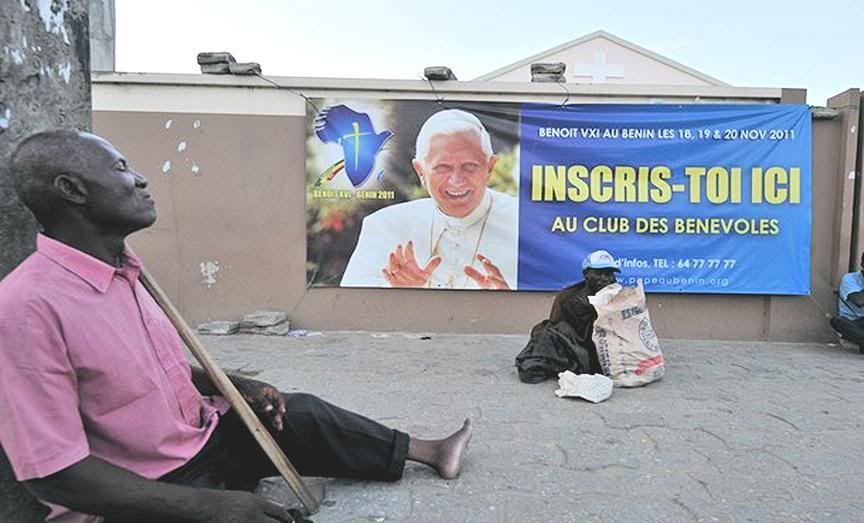
|
| |
 15/11/2011 13:28 15/11/2011 13:28 |
|
| | | OFFLINE | | Post: 23.776
Post: 6.350 | Registrato il: 28/08/2005
Registrato il: 20/01/2009 | Administratore | Utente Master | |
|
 Tuesday, Nov. 15, 33rd Week in Ordinary Time
Tuesday, Nov. 15, 33rd Week in Ordinary Time

ST. ALBERTUS MAGNUS (ALBERT THE GREAT) (Germany, 1193-1280)
Dominican, Philosopher, Bishop, Doctor of the Church
Benedict XVI devoted his catechesis on 3/24/10 to his fellow German
www.vatican.va/holy_father/benedict_xvi/audiences/2010/documents/hf_ben-xvi_aud_20100324...
Considered the greatest German scholar, theologian and philosopher of the Middle Ages, Albert the Great advocated the 'peaceful coexistence' of science and religion. In his writings, Albert commented on all of Aristotle's works and tried to explain as much as was known of the world at the time. He became a mentor to Thomas Aquinas, whom he outlived. After serving as Provincial in Germany for the Dominican order, he was made Bishop of Regensburg but gave it up after three years, preferring to return to teaching in Cologne where he died at age 87. He was canonized by Pius XI in 1931 and named a Doctor of the Church ['Doctor of Science'].
Readings for today's Mass:
www.usccb.org/bible/readings/111511.cfm
AT THE VATICAN TODAY
No events announced for the Holy Father today.

The Holy Father has named Mons. Adriano Bernardini, until now Apostolic Nuncio in Argentina, as the new
Apostolic Nuncio in Italy and the Republic of San Marino. He replaces Mons. Giuseppe Bertello who was named
President and Governor Vatican City State last summer.
OR today.
The only papal story is the text of the Holy Father's Angelus messages on Sunday. Page 1 stories: Mario Monti named to form new Italian government; Damascus under pressure from the Arab league and the international community for its continuing repression of anti-regime protestors.
[Modificato da TERESA BENEDETTA 15/11/2011 13:34] |
| |
 15/11/2011 20:45 15/11/2011 20:45 |
|
| | | OFFLINE | | Post: 23.777
Post: 6.351 | Registrato il: 28/08/2005
Registrato il: 20/01/2009 | Administratore | Utente Master | |
|
 The new Nuncio to Italy:
The new Nuncio to Italy:
Last February at St. Peter's,
he preached a homily denouncing
Benedict's opponents within the Church
by ANDREA TORNIELLI
Translated from the Italian service of

November 15, 2011
As anticipated for some time by VATICAN INSIDER, Benedict XVI has appointed Archbishop Adriano Bernardini, until now Apostolic Nuncio in Argentina, to be the new Apostolic Nuncio to Italy and the Republic of San Marino.
Born 69 years ago in Pian di Maleto, in Italy's central northeast Marche region, Bernardini was ordained a priest in 1968 in the Diocese of Rome, and named Nuncio to Bangladesh in 1992. In 1996, he became Nuncio to Madagascar, Mauritius, and the Seychelles Islands; three years later, he was reassigned to Thailand, and in 2003, to Argentina.
Last February, at a Mass he celebrated in the Altar of the Chair at St. Peter's Basilica, Bernardini gave a homily about the attacks against Benedict XVI coming from within the Church itself, a text which was translated and posted on several Internet sites.
"We are witnessing today", he said, "the exceptional hounding of the Catholic Church in general and the Holy Father in particular. What is behind all this? What is the principal reason? "
"It can be said in a few words: Because the message of Christ gives us the Truth. When the truth is not opposed by the forces of evil, then everything goes well. But when there is the slightest opposition to this truth, then there arises an assault that uses defamation, hatred, and even persecution, against the Church and more specifically, against the person of the Holy Father".
The Nuncio cited some examples: "The years immediately following the Second Vatican Council generated a sort of euphoria for the Church and consequently for the Pope. But all it took was the publication of the encyclical Humanae vitae (1968) - in which Paul VI confirmed the traditional doctrine that the conjugal act and its procreative purpose cannot be separated - and the most ferocious criticism against Paul VI erupted, though up till then, he had been in everyone's good graces. His sympathy with Jacques Maritain and his 'integral humanism' had led the modernist elements within the Church as well as political progressivists in the world to place their 'hopes' in him.
"The same thing happened many times during the long Pontificate of John Paul II. When he was elected. the Western cultural elite were in thrall to the Marxist reading of reality. John Paul II did not, of course, adopt this embarrassing cultural conformism [because he had lived 32 years fighting Marxism-Communism in his native Poland!] but instead undertook against communism a harsh duel which made him the object of an assassination attempt in an obscure homicidal plot [since attributed to the Soviet Union acting through Bulgarian secret services].
"Then he was fiercely opposed in the field of bioethics after the publication of his encyclical Evangelium vitae in 1995, which was a solid and uncompromising compendium of Catholic doctrine on questions of life and death".
And now, Bernardina pointed out:
"The target has become Benedict XVI - already the object of scorn before he became Pope because he was the 'guardian of the faith'. As soon as he was elected Pope, the reaction from commentators around the world was a grab bag that ranged from anger to fear and even outright horror!
"But one thing is sure: Pope Benedict XVI has imprinted on his Pontificate the seal of continuity with the bimillennial tradition of the Church, and above all, that of purification. Necessary because uncertainty in the faith is always accompanied by the obfuscation of morality.
"Indeed, if we are to be honest, we must recognize that year after year, the number of those who are convinced that membership in the Church does not require acknowledgment and adherence to her objective doctrine has been steadily growing among theologians and religious, nuns and bishops.
"They affirm a Catholicism a la carte, in which every individual can choose the portion he prefers and reject any dish he thinks will be 'indigestible' for his beliefs".
The Nuncio described a Catholicism that has been dominated by a confusion of roles, with "priests who do not bother to apply themselves to a proper celebration of the Mass nor encourage confessions, because they have 'more important things' to attend to. And with laymen and women eager to take on some priestly function to gain a weekly modicum of parochial celebrity by leading prayers for the faithful or distributing communion".
The Pope, said Bernardini, "has been abandoned by the opponents of the truth but even worse, by some priests and religious, and not just by some bishops. But not by the faithful. The clergy continues to be in crisis and the bishops generally prefer to take a low profile, but the faithful are still there with their enthusiasm for Christ and his
Church".
Such words indicate that as Nuncio to Italy, Bernardini will nominate Italian bishops who are definitely Ratzingerian. Contrary to what one might expect, the Apostolic Nuncio in Italy has less powers than those exercised by Nuncios in other countries.
However, it is a role of great prestige, which necessarily means closeness to the Holy See as well as the Italian bishops' conference - and all these factors play into the process of designating new bishops in Italy.
Bernardini's new appointment crowns his career in Vatican diplomacy. Described as a calm and reserved man, he is expected to assume his new position within a month at the Nuncio's historic residence on Via Po in Rome - which was a gift to the Vatican by a rich Jew in gratitude for assistance to the Jews during the years of Nazi persecution.
He will immediately be involved in the important nomination of a new Patriarch of Venice to succeed Cardinal Angelo Scola, who became Archbishop of Milan. Of course, in this case, it appears that a 'more direct' process is underway that would circumvent the normal process of consulting the Italian bishops and subsequent discussions by the full Congregation for Bishops of the 'short list' of candidates eventually submitted by the Nuncio. [The Pope, as Primate of Italy, exercised this option in the choice of Cardinal Scola for Milan.]
|
| |
 16/11/2011 12:05 16/11/2011 12:05 |
|
| | | OFFLINE | | Post: 23.778
Post: 6.352 | Registrato il: 28/08/2005
Registrato il: 20/01/2009 | Administratore | Utente Master | |
|
 Four Italian universities open their doors
Four Italian universities open their doors
to 'Jesus of Nazareth' roundtable discussions
by Silvia Guidi
Translated from the 11/16/11 issue of

"How far we are from the negative reaction to the visit of the Pope to La Sapienza University in Rome in 2008!" says Fr. Giuseppe Costa, director of the Vatican publishing house, Libreria Editrice Vaticana (LEV), presenting a cycle of roundtable discussions of the Holy Father's book JESUS OF NAZARETH - vol. 2, at four Italian universities from Parma in the north to Messina in the south.
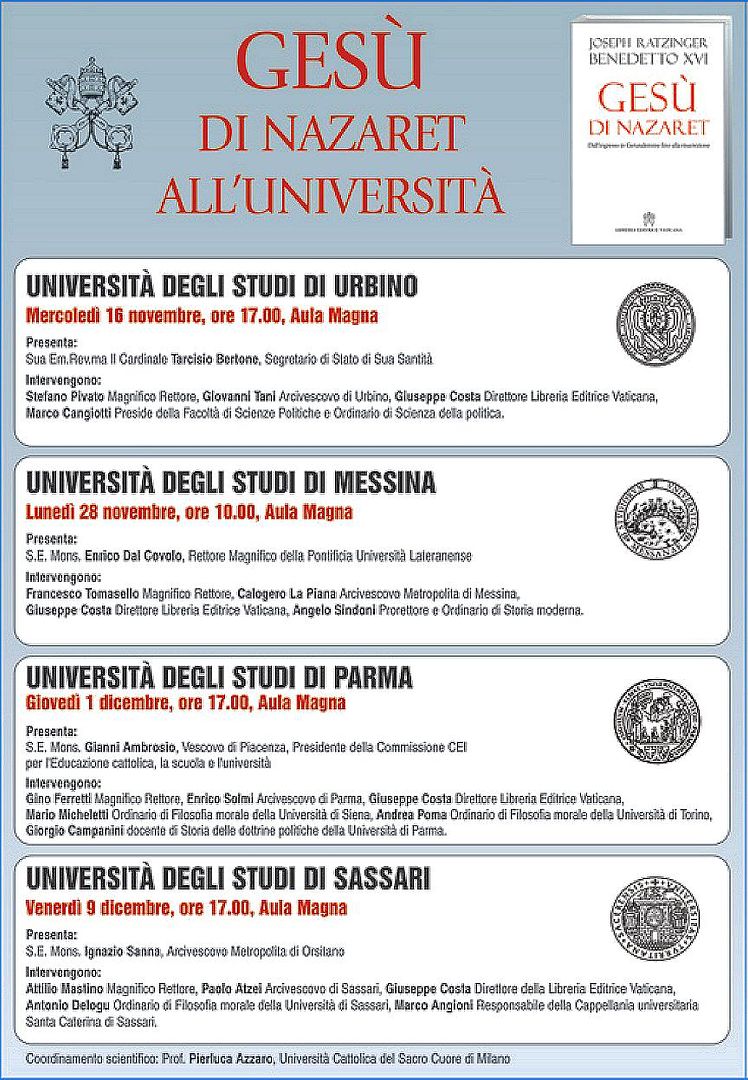
Costa says the book represents the climax of theological studies by a "a man who has been teaching for most of his life - and how much more natural that his thought should be presented in university circles?"
He added: "We made the proposal to four universities who accepted with enthusiasm, and so we organized these encounters in the universities of Urbino, Messina, Parma and Sassari. As soon as this was known, other universities have asked us to do the same for them".
The first of these discussions takes place today, Nov. 16, at the Universita Carlo Bo, named after an intellectual who had always demanded more than just the esthetic intuition sought by Benedetto Croce or positivist historicism, and analyzed texts for their responses to life challenges in terms of whether they were existentialist or Christian.
Cardinal Tarcisio Bertone will lead the presenters, along with Stefano Pivato, university rector; Mons. Giovanni Tani, Archbishop of Urbino-Urbania-Sant'Angelo in Vado; Fr. Costa himself; and Marco Cangiotti, president of the faculty of political sciences.
"More than five centuries ago," the rector writes in prepared opening remarks, "Guidobald I reordered the college of 'doctors' in Urbino. A few months later, Pope Julius II, with a papal bull dated February 18, 1507, completed the original nucleus of this university by allowing it to grant degrees, thus setting the seal on our origins. Since then, during the next five centuries, the exchanges between secular and religious culture have found fertile ground for encounter in our halls".
The Pope's book, he said, is an occasion of 'widening reason' to use the term that Benedict XVI used in his lectio magistralis at the Universality of Regensburg in September 2006. "The occasion is provided by his reflections on Jesus, from the entry into Jerusalem to the Resurrection. We know of the book's great sales success, but we are also aware of the high value of its contents, which is extremely stimulating for anyone who, in the university context, has the growth of knowledge at heart".
It also suggests a methodology of thought that is particularly invaluable in an era dominated by the 'extenuation of subordinates' [I cannot think of a phrase so pompous and so itnrinsically meaningless that it suggests nothing whatsoever even to someone like me who was worked with words for a career!], as Cardinal Gianfranco Ravasi described in concluding the Vatican colloquium last week on misunderstandings between the media and the Church - by which he meant the tendency to reduce any detailed argumentation into a slogan. [Ah so!]
To be seriously concerned about the growth of knowledge means not to be resigned to the systematic disappearance of context, which is typical of the fragmentary nature of communications adapted to the soundbite mentality of television, which makes it easy to extrapolate a detail and transform it into a blunt dialectical weapon. [Is this Ravasi's opinion or the reporters? It's a good obsevration - I just want it properly attributed.]
A textbook case of this was the 'misunderstanding' that underlay the 'Sapienza case' three years ago in which the Pope was constrained to cancel a scheduled lectio magistralis at the La Sapienza University in Rome, now a state university, but originally founded as a pontifical university.
It was a text in which he cited secular thinkers like John Rawls and Juergen Habermas along with great figures from Christian tradition. But even news reports, in its most disconcerting aspects, can become a magistra vitae, a life teaching.
Likewise, from then onwards, it is no longer superfluous to reiterate that citing anyone does not mean automatically sharing all of their thought, and that careless 'cut and paste' research can lead to unforeseen serious consequences.
As we now know, the Sapienza physics professors who spearheaded the protest against the Pope based their objection on an erroneous Wikipedia entry which they used as their only source without bothering to directly check it out. {But it provided a convenient pretext for them to say, "This man - Joseph Ratzinger - is so reactionary that he justifies the trial of Galileo, and such an anti-science man cannot be allowed to speak at this university".]
In a 1990 lecture at the University of Parma, Cardinal Joseph Ratzinger had cited Paul Feyerabend, a contemporary philosopher of science, about Galileo. Far from espousing Feyerabend's anarchic view of science, nor using Feyerabend's arguments to retrospectively justify the condemnation of Galileo by the Roman Inquisition in the 17th century, the cardinal was simply pointing out that scientific rationality has its limits, exposed by dispassionate criticism, and should therefore be subject to reasoning that is beyond philosophical character and that is open to transcendence - and that ought to be always open to confrontation with reasonable positions that are quite different.
Feyerabend, who was considered a heretic and bizarre by some of his colleagues, was reportedly stunned and flattered when he heard that Ratzinger had read him (as Alessandro Tassari reports in a January 2008 article in Avvenire) that he told his friends, "What a great thing that a cardinal should be so anarchic as to cite me". (The lecture was in 1990. Feyerabend died of a brain tumor in 1994).
You can see how, with articles like this, I constantly throw up my hands at the bizarre journalism that is not uncommon in the pages of OR under editor Vian. This article was meant to be about these university roundtables on JESUS OF NAZARETH, but then it morphs into a rehash of the Sapienza episode which makes up more than half of the article, and which assumes that the ordinary reader would pick up her allusions about an event that is fairly remote in time.
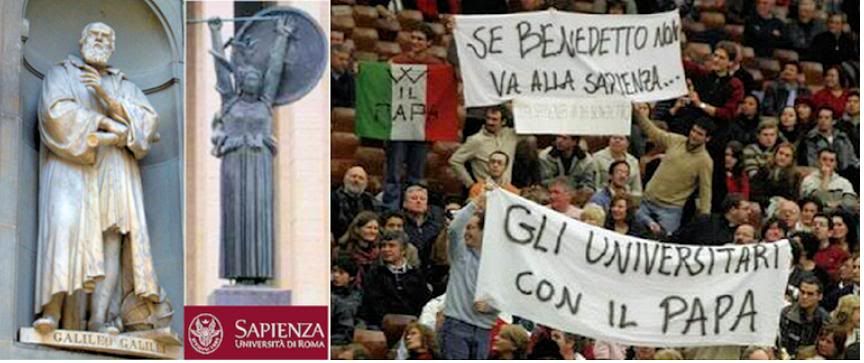
In any case, it prompted me to go back and look into the reports and commentaries about the Sapienza episode as I 'chronicled' them in the posts (many of them translated from the Italian press) I made in the NEWS ABOUT BENEDICT thread of the PRF at the time. I was struck all over by 1) the embarrassing ignorance of university professors teaching one of the most precise of sciences, physics, who went out on a limb with an erroneous fact they had not cross-checked - and for which, by the way, they have never apologized; and 2) the appalling tyranny of the minority in these politically correct days, when 67 professors out of a faculty of 4,500, and some 200 ultra-left students in a campus of 45,000, were able to force the cancellation of the Pope's appearance at La Sapienza. All because they threatened to mobilize and let loose labor-uinon allies and veterans of disruptive and violent anti-globalization protests in their support. Very reminiscent of the mob tactics currently used by the 'Occupy Wall Street' protesters.
Those nitwit professors are so tunnel-minded, ideologically blinded, and willfully a-historical that they probably aree not even aware of St. Albert the Great, the only German Doctor of the Church so far, whose feast we celebrated yesterday. He was a 'Renaissance man' long before the Renaissance in his all-around intellectual interests, his faascination with science and showing how it went hand in hand with faith.
One of the little-known facts that came to light in January 2008, though still hardly noticed, was testimony volunteered by Cardinal Zenon Grocholewski, in a newspaper interview, who said:
As far as Galileo is concerned, it was Cardinal Ratzinger himself, in fact, as Prefect of the Congregation for the Doctrine of the Faith, who initiated for the Pope (John Paul II) the proceedings that annulled the ancient Church condemnation.
This, of course, is hardly if at all mentioned in all the laudatory reporting about that 'rehabilitation' of Galileo by John Paul II. Grocholewski was named by his fellow Pole John Paul II to be Prefect of the Congregation for Catholic Education and remains the only holdover from the previous Pontificate in the current Curia, as he is only 72 and has three more years before reaching canonical retirement age.
In any case, it is certainly worth re-posting a translation of the paragraphs from the Parma lecture given by Cardinal Ratzinger. Andrea Tornielli, presenting it to his readers at the time, wrote this:
It appears the [Sapienza] scientists based their militant stand on a citation they found in Wikipedia which they uncritically - and most unscientifically - picked up because it would attribute 'obscurantist' thinking to the future Pope.
Who, in fact, had expressed the opposite position, distancing himself from some modern rethinking about the Galileo case, and certainly not adapting it as his.
Regensburg once again! even if this time, the distortion comes after 18 years.
WHAT CARDINAL RATZINGER
SAID ABOUT THE GALILEO CASE
From a lecture at the
University of Parma
March 15, 1990
In the past decade, the resistance of nature to manipulation by man has emerged as a new element in the overall cultural landscape. The question about the limits to science and the criteria to which it must be held has become inevitable.
Particularly significant in this change of intellectual climate, it seems to me, is a different way of looking today at the case of Galileo.
This event, which was hardly considered in the 17th century, was elevated to myth during the Enlightenment of the next century. Galileo was seen as the victim of the' medieval obscurantism which persists in the Church'.
Good and evil were separated by a clearcut line. On the one hand, the Inquisition - as the power which incarnated superstition, the enemy of freedom and of knowledge. On the other, natural science, represented by Galileo - here was the force for progress and human liberation from the chains of ignorance which kept man impotent before the forces of nature. The star of Modernity now shone over the dark night of the Middle Ages.
According to Ernst Bloch, the heliocentric system [the sun as the center of the universe, as Galileo believed], as well as the geocentric system [the earth as the center], were both based on undemonstrable premises. Among these, principally the premise of the existence of absolute space - something which was later refuted by the theory of relativity.
Curiously, it was Bloch himself, with his romantic Marxism, who was one of the very first in our time to contradict the Enlightenment myth, offering a new interpretation of what happened [with Galileo].
Bloch represents just one of the modern concepts of natural science. But the judgment he draws from it is surprising: "Once the relativity of motion was accepted as certain, the ancient human and Christian reference system has no right whatsoever to interfere in astronomical calculations and their heliocentric simplifications. Nevertheless, it has the right to remain faithful to its own concept of the earth in relation to human dignity,and to conceive of the earth around what has happened and will happen in this world itself."
If in Bloch's statement, two spheres of knowledge are still clearly differentiated with respect to their methodology - recognizing the limits as well as the rights for both - the synthetic [summarizing] judgment of the agnostic-skeptical philosopher Paul Feyerabend appears much more drastic.
He wrote: "The Church in the time of Galileo held to reason more than Galileo himself, by taking into consideration the ethical and social consequences as well of Galileo's doctrine. Its verdict on Galileo was rational and just, and only reasons of political opportunism would legitimize changing it."
From the viewpoint of the concrete consequences of Galileo's revolutionary thought, C. F. von Weizsacker went one step further, seeing the 'straightest line' leading from Galileo to the atomic bomb.
It would be absurd to construct on the basis of such statements a hurried apologetics [of the Church's action with respect to Galileo]. Faith does not grow out of resentment and rejection of rationality, but from its fundamental affirmation and inscription in a much greater reasonableness.
With this, I wanted to illustrate an emblematic case which proves to what point modernity's doubts about itself now involve even science and technology.
From Svolta per l’Europa? Chiesa e modernità nell’Europa dei rivolgimenti [A turning-point for Europe? Church and modernity in the a time of unrest], Edizioni Paoline, Roma 1992, pp. 76-79.
Some notes about the three contemporary thinkers cited by the Pope:
- Ernst Bloch (1888-1977) was a Marxist German philosopher whose ideas were most influential in the protest movements of 1968 and in liberation theology. He taught at Tuebingen during the years that Prof. Ratzinger was there.
- Paul Feyerabend (1964-1994) was an Austrian philosopher of science who worked with Karl Popper and Ludwig Wittgenstein in Vienna, and later spent three decades teaching at the University of Berkeley in California. His best-known book Against Method: An outline for an anarchic theory of knowledge, advocates his anarchic concept of science and his rejection of any universal methodology in its exercise.
- Carl von Weiszsaecker (1912-2002) was a German nuclear physicist and philosopher who was on Werner Heisenberg's team that was tasked with developing an atom bomb for Germany in the 1940s. He survived the longest among them. After the war, both Heisenberg and he indicated that they did not intend to give Hitler the A-bomb, and Weiszsaecker became an anti-nuclear arms activist.
The rather extensive coverage of the Sapienza episode in the PRF begins on Page 154 of the NEWS ABOUT BENEDICT thread, with the full text of the lecture he prepared for delivery on Page 156
freeforumzone.leonardo.it/discussione.aspx?idd=354494&p=156
It's a magnificent lecture, about the role of the university and what the Church has to say about it (having invented the very idea). I have always thought it should be included among Benedict XVI's great secular speeches along with Regensburg, Bernardins and lately, the Bundestag, necessarily more substantial and scholarly than the one at Westminster Hall. Anyone interested may navigate backward or forward from page 156 and find excellent commentary, including three by Renato Farina, who concetrates on the person of Joseph Ratzinger, written over the space of a few days. There's also a brief historical overview of the Galileo case at the top of Page 157.
[Modificato da TERESA BENEDETTA 16/11/2011 12:54] |
| |
 16/11/2011 14:03 16/11/2011 14:03 |
|
| | | OFFLINE | | Post: 23.779
Post: 6.353 | Registrato il: 28/08/2005
Registrato il: 20/01/2009 | Administratore | Utente Master | |
|

 What the following headline says is a natural consequence of the fact that the liberal MSM have taken it upon themselves to be advocates of embryo stem-cell research (ESC) as if that were the only path possible for stem-cell research. As we saw, a recent AP story reporting that the first embryonic stem-cell (ESC) lab funded by the Obama administration has shut down its work on ESC, never once mentioned that adult stem cell (ASC) research is also going on, much less refer to the Vatican conference at all...That the conference does get mentioned in Forbes is almost surprising.
Vatican stem-cell conference
What the following headline says is a natural consequence of the fact that the liberal MSM have taken it upon themselves to be advocates of embryo stem-cell research (ESC) as if that were the only path possible for stem-cell research. As we saw, a recent AP story reporting that the first embryonic stem-cell (ESC) lab funded by the Obama administration has shut down its work on ESC, never once mentioned that adult stem cell (ASC) research is also going on, much less refer to the Vatican conference at all...That the conference does get mentioned in Forbes is almost surprising.
Vatican stem-cell conference
gets thin coverage in MSM
by John Farrell

November 15, 2011
This past week’s international stem cell conference held at the Vatican offered a lot of hope for adult stem cell therapies. [Farrell himself makes the fundamental error of not saying that the conference was about adult stem cells, which makes all the difference!]
The conference took place over two days. Among the speakers: Peter Coffey of University College of London, whose research includes stem cell therapies for treating macular degeneration; Monsignor Ignacio Carrasco de Paula, current Head of the Pontifical Council for Life; Arthur Caplan, Professor of Bioethics at University of Pennsylvania, and Robin Smith, CEO of NeoStem, U.S. based firm which helps people bank their own stem cells for possible future use.
Judging from the Catholic Press in the U.S., the Vatican seems to be more interested in showing the world it is not “against” science than the actual merits of the different types of stem cell research itself. [That is unfortunate, but perhaps it is because the reporters themselves do not quite appreciate the basic facts about stem-cell reseawrch and the various pathways possible. Because anyone with a modicum of udnerstanding about what stem cells are, cannot possibly keep from trying to inform the public about its technical facts in an understandable and comprehensive way, and not stop at simply saying the Church is not anti-science!]
Our Sunday Visitor correspondent Brian Fraga interviewed Smith. Her enthusiasm for the promise of adult stem cell therapies and induced pluripotent stem cells (adult cells that have been reprogrammed into stem cells) was evident.
We want to create the road map of the future of adult stem cell research. We want to lay the groundwork of a collaboration between the patrons and the scientists to advance research and reduce human suffering. This is a five-year partnership between NeoStem and the Vatican. We want to be able to educate society’s understanding of what an adult stem cell is and what its promises are by supporting scientific research in accord with ethical values.
The long- and short-term initiatives around this partnership is that they can also help Church leaders, politicians and educators to understand this cultural paradigm shift, regenerative medicine, that is arising in medicine. We hope that we can get not just Church leaders, but also ministers of health and the scientific community to work together to advance the research and transfer stem-cell therapies safely from the laboratory to the clinic.
Vatican Insider provided its own over-dramatic take (with boldface):
[DIM=110t]The “regenerative medicine” that promises to rebuild organs damaged by illness or by age, is one of the most advanced frontiers in medical research today. But it presents huge ethical dilemmas because the stems are obtained from human embryos at the price of destroying them.
For Papa Ratzinger, who today gave an audience for the participants of the Conference, (the result of the partnership between the Pontifical Council for Culture and the American pharmaceutical company NeoStem), those who justify these actions with the possibility of saving human lives and curing illnesses that are currently incurable commit “the grave mistake of denying the inalienable right to life of every human being, from the moment of conception to their natural death.”
[I do not see what is 'over-dramatic' about the two statements Farrell underscores. The first one is simple objective fact; the second is the Pope's reaffirmation of Catholic doctrine.]
But Arthur Caplan, who also spoke at the conference, was not as persuaded in his assessment at MSNBC. He was particularly critical of claims of any “paradigm shift” in stem cell research.
While some top-tier science was presented at the conference, there was too much time given to claims of cure that had little to support them but patient testimonials, small studies with no long-term follow-up, and, to be blunt, some science that has nothing but the backing of a single very optimistic scientist looking to attract a grant or an investor.
{It is unfortunate if that is indeed the case, because then, the ASC advocates would be just as short-sighted and self-serving as the ESC researchers in puffing up their claims to attract more grants. Perhaps the science reporters of the major media outlets should keep track of progress, or lack thereof, in both ASC and ESC research and report about developments on both sides insteasd of the current tendency to ignore ASC research altogether.]
This sounds harsh, but I think Caplan raises a good point: embryonic stem cell research needs to be discussed more broadly, even by institutions or groups that have ethical questions about it. [ The problem is that MSM in general tends to overlook progress in adult stem-cell research altogether in the interest of pushing embryonic stem-cell research.]
I’ll be speaking soon with some of the other presenters at the conference, one of whom in particular, Father Nicanor Austriaco, of Providence College, is a first rate scientist with his own lab.
[Modificato da TERESA BENEDETTA 16/11/2011 14:07] |
| |
|
|
|
|